As of May 2025, there have been over 80 GNL Projects from the Faculty of Liberal Arts and Professional Studies (LA&PS), School of the Arts, Media, Performance & Design (AMPD), Glendon College, Faculty of Education, Faculty of Health, Lassonde School of Engineering, York University English Language Institute (YUELI), and Faculty of Science. Some faculty members have conducted the GNL courses multiple times (made modifications over many iterations and/or worked with different partners). Some examples of GNL Courses can be found below.
GNL-Enhanced Courses:
Click on each course title to learn about the course and how the GNL approach was implemented.
Students interested in these courses should contact the relevant professors or departments listed below for more information
Summer 2025
International Arts Entrepreneurship & Public Engagement – PANF 3800 3.0
Course Director: Dr. Emilia White
In partnership with Singapore Management University (SMU)
Course Description: International Arts Entrepreneurship & Public Engagement is a 5-week hybrid international exchange course between the Integrative Arts program at York University’s School of Arts, Media, Performance & Design (AMPD), and the Bachelor of Integrative Studies (BIS) program at the College of Integrative Studies, Singapore Management University. In this hands-on creative and skills building course, students work together in small groups to create projects that address a problem or social issue. Through collaboration, students will build essential skills in arts curation, entrepreneurship, and community engagement.
GNL Components: The course feature workshops and visiting lectures with international artists and arts administrators, culminating in an immersive showcase of the final works. Sample activities include readings & discussions; hands-on workshops; lectures; visiting artist and arts administrator presentations -group work time and hands-on activities -virtual conversations and activities between students in both locations: screenings & livestream viewings. This course provides a great combination of hands-on experience and virtual exchange between students in Toronto and Singapore.
Cross Campus Capstone Classroom (C4) Project - Summer C4 3.0
Course Director: Prof. Robin Metcalfe and the C4 team at York and other C4 Canadian partner universities (e.g., Prof. Franz Newland, University of Ottawa)
In partnership with Universidade do Vale do Rio dos Sinos (Unisinos) (Brazil)
Course Description: This course brings together undergraduate students from across multiple universities to work together in multidisciplinary teams on the pressing, “real-world” challenge of homelessness, which is posed by organizations operating in both the for-profit and not-for-profit worlds (both on- and off-campus). Supported by a team of professors and educators from several faculties across the different universities, we work together to mobilize and hone critical, creative, and strategic thinking skills, in collaboration with teammates, by researching and designing effective solutions to the challenges. Please find out more about the C4 project here.
GNL Components: This is the first time C4 integrates the Collaborative Online International Learning (COIL) or GNL format in their project as popularity grows and C4 expands their base of international institutions as well as our international project partners. In the COIL format, students have the opportunity to build global networks that include students with common interests from other institutions as well as our international project partners, creating the potential for global career pathways. The time in the classroom is divided into multiple parts:
- GNL/COIL Central: Content-based modules meant for the entire student group across all sites.
- Team Time: Small-group, topic-driven meetings and skill development activities, with consultations from instructors and/or the project partners.
- Peer Review: Time with other students to give and receive feedback.
- Management Huddles: Strategic meetings of just the management students.
Winter 2025
Chemical Dynamics – CHEM1001
Chemical Dynamics- CHEM1001
Course Director: Prof. Hovig Kouyoumdjian
In partnership with MAHSA University (Malaysia)
Course Description: This course introduces students to organic chemistry, explores the principles of green chemistry and energy alternatives, and promotes sustainable practices. The embedded GNL components focus on developing students’ collaborative skills through group presentations and/or infographics and expanding students’ global perspectives through activities that involve analyzing, discussing ethical and social aspects of sustainable applications and practices (in oil industry and palm oil industry) and suggesting green alternatives.
GNL Components: Course instructors presented the initiative to their students and directed students to eClass to select topics. Students (groups of 5-10) discussed and presented the issues from the perspective of their countries and collaboratively worked to address these issues.
- Ice breaker: Students created an AI-generated image in Canva describing their hobbies, sports, movies, food, and cultural interests, and then used Padlet to paste the AI-generated image anonymously and interact with their international partners
- Comparative and sustainability project in Padlet: Groups compared/contrasted industries in their countries: Oil industry in both countries (3 groups) and canola oil (Canada) and palm oil (Malaysia) industries (3 groups) to figure out the applications and practices, and implications on public health and the environment. Green alternatives were proposed, and students were prepared to summarize and present.
- Citizen Science Project in Zooniverse (continued discussions in Padlet): Groups selected a project and contributed to the people-powered research, and then prepared a presentation (why choosing the project and summarizing students’ contribution)
- Presentations and reflections: students prepared a 20-minute presentation about the two projects + 5 minutes of Q&A. All 6 members contributed and presented and then reflection activities were done.
Ethics and health equity in interdisciplinary practice - NURS2513
Ethics and health equity in interdisciplinary practice - NURS2513
Course Director: Prof. Iris Epstein
In partnership with FACULDADE DE MEDICINA DE OLINDA (Medical School in Brazil)
Course Description: This course focuses on bioethical theories, health equity, and related concepts and current issues relevant to nursing and other health professionals’ practice. Reflection on self-beliefs and the meaning of collaboration with various clients and other practitioners occurs in the context of ethical decision making and the application of various ethical frameworks. The impact on client health and autonomy is explored. The embedded GNL project aims to help students define an ethical dilemma about accessing healthcare/patient teaching/hospital to communicate care, and then clarify the policy context and analyze the current impact, followed by an evidence-based solution/call for action.
GNL Components: In the three-week pilot of this GNL project, the following synchronous meetings (and students’ asynchronous meetings to work with each other at their own time) were conducted:
- Studio #1: Kickoff Meeting (Groups intro, ice-breaker activities and project outcomes, reading and group work: selecting one ethical dilemma/issue)
- Studio #2: Sharing and Synthesizing Insights/solutions: students work in groups with the facilitation of the instructors
- Clarifying the policy context
- Articulating positions and addressing moral/professional rationales
- Proposing evidence-based solutions
- Key Ideas for Policy Action Briefs, Q&A, feedbacks from instructors
- Studio #3: Finalizing Policy Action Briefs
- Groups (mix of Brazilian and York students) work with each other to draft the Policy Brief and design a slide deck or Infographic.
- Each group delivers a 5-minute presentation of their policy action brief, which includes: Overview of the ethical dilemma, Guiding principles and concepts, Policy and program criteria, and Reflections and outcome
- Reflection on the experience: surveys and experience sharing
Directed Reading in Structural Engineering - GS/CIVL 6400
Directed Reading in Structural Engineering - GS/CIVL 6400
Course Director: Prof. Mojgan Amaneh Jadidi
In partnership with Nottingham Trent University (NTU) – UK
Course Description: This course is embedded as a Directed Reading in the Postgraduate degree for Civil Engineering students: Special Topics in Environmental Engineering. The course was designed by Dr. Ehsan Asnaashari (NTU) titled “Zero Lean Waste: Reimagine Construction Practice”. This course aims to address the problem of waste generation in construction projects globally by adopting a lean perspective. While managing physical waste is important, this project goes further by identifying root causes and providing solutions based on lean construction principles
GNL Components:
- Online lectures, workshops (one for each institute), and asynchronous materials on: lean waste, sustainable construction, and UN SDGs
- Collecting data (groups consisting of both York and NTU students): Each team focused on one type of lean waste and was required to collect primary and secondary data and then conduct a literature review on the relationship between Lean and Sustainability. Visual evidence (photos from live construction sites) from projects that are currently under construction in Canada, the UK or other countries was collected and would be used for qualitative methods.
- Miro Board: Students shared and collaborated on Miro boards and uploaded their visual assets and other documents on the board, which could be shared with wider audiences in academia and industry as a journal or conference paper.
- Presentation: All groups presented their Miro board in an 8-minute presentation and a panel of academics from two institutions evaluated the performance of all groups and selected the best one.
Non-Western Perspectives on Education and Learning - EDST 2700 Section M
Non-Western Perspectives on Education and Learning - EDST 2700 Section M
Course Director: Prof. Andrea Valente
In partnership with Universidad San Francisco de Quito (USFQ) - Educator
Course Description: This course engages students in an intercultural exploration of education. Non-western traditions and beliefs and their reflection on schooling and teaching/learning practices are examined. Throughout the course, students examine diverse cultural and educational contexts and practices in relation to national and global demographics, geography, history, economic and socio-cultural relations. The collaborative GNL project is titled "Mindfulness Education." The objective is to offer students the opportunity to explore, share, practice, and teach wellness activities that may integrate non-western traditions. This GNL project aims to help students articulate the relationship between culture, education and schooling and how school systems are both shaped by and help to shape a society.
GNL Components: This is a four-week GNL collaboration that included:
- Week 1: Ice breaker (group discussion and forum with responses in Spanish and English), followed by an orientation session via Zoom (synchronous and asynchronous activities)
- Week 2: Teamwork - asynchronous and synchronous activities. Task-based activity: design of a wellness toolkit. Each team chose a wellness activity and created a toolkit/card with a description of the activity (bilingual), using visuals, informing the target audience (children, teens, adults, etc.), and including suggestions such as frequency, place, equipment, clothes, etc. Students provided a bilingual version in English and Spanish and uploaded it on Padlet.
- Week 3:Teamwork (cont.)
- Recording audio/video demo of the wellness toolkit and explaining and demonstrating the toolkit and posting the video and the script/translation in Padlet.
- Online Exhibition/Full Forum: Students ‘visited’ each team's toolkit to learn about different mindfulness activities. Team leaders collected their peers' comments and posted them under the activity by answering the following guiding question: What do you like about the activity, and why? In which situations do you think this activity could be beneficial?
- Week 4: Reflection (wrap-up Zoom meeting) - students created a new video sharing their thoughts about their experience based on some guided questions by the instructors.
Philippine Folk Dance - FA/DANC 2510/3510/4510 3.00
Philippine Folk Dance - FA/DANC 2510/3510/4510 3.00
Course Director: Prof. Patrick Alcedo
In partnership with the University of the Philippines (Philippines) & the Bayanihan: The National Dance Company of the Philippine Women's University (Philippines)
Course Description: Due to the country’s colonial history, geographical makeup, and the porosity of its borders, Philippine culture is deeply complex. Through the folk dances that will be taught, this course will embody the wide array of cultural and historical influences that have defined what the Philippines is today. Rich in fundamental movements and rhythms, the selected traditional dances for this course help make sense of the complexities and fluidities of who the Filipinos are.
GNL Components: The students at York had the opportunity to learn dances from members of the Filipiniana Dance Group and the Bayanihan Dance Company via Zoom and video recordings or asynchronously through a virtual platform of their choice. Aside from embodying movements, the students also learned the costumes and music appropriate for their dances. At the end of the course, the students at York presented the dances they had learned and the insights they gained from their cross-cultural engagement. Such a "recital" was organized in a hybrid manner and attended by members of the Filipiniana Dance Group and the Bayanihan Dance Company, who would potentially meet with this group of York students in a faculty-led program abroad in 2026.
Literary Translation-Traducción Literaria - SP 4915
Literary Translation-Traducción Literaria - SP 4915
Course Director: Prof. Maria Constanza Gunzman
In partnership with Universidad Pedagógica y Tecnológica de Colombia (Colombia)
Course Description: This course provides an introduction to the theory and practice of literary translation. With an emphasis on the Americas, it introduces notions of literary and critical theory to apply them to the analysis and translation of various texts from diverse cultural contexts. The GNL project goal embedded in this course aims to develop students’ Canadian and Latin American literature competence through its translation(s). The project also aims to help students learn how to integrate concepts and methods into literary translation practice and develop strategies for the production and revision of literary translations, and therefore generate a creative and pedagogical space grounded in mutual listening, collective work, and collaboration.
GNL Components: There were joint class session activities: Joint lectures (conversation between teachers about the main course topic), followed by students’ synchronous and asynchronous activities to work collaboratively. Student presentations (individual and group) were organized to showcase their work and hands-on practice in groups (from both institutions), followed. Feedback conversations about the project between instructors and students ended the experience.
Enquetes sur les systemes educatifs francophones- FRAN 4270
FRAN 4270 - Enquetes sur les systemes educatifs francophones
Course Director: Prof. Muriel Peguret
In partnership with the University of Orléans (France)
Course Description: This is a repeated GNL that is organized every Winter term for many years. The goal of this course is to experience cultural differences in education in various countries or regions of the Francophonie. Students in the course at Glendon and the University of Orléans (France) are engaged together in an active and interactive investigation to observe, dialogue, compare, collaboratively create, and analyze differences in educational approaches.
GNL Components: Comparisons based on different themes (equity, FSL teaching, school structures, etc.). The final task group work was planning an FSL lesson together with a written synthesis of ideas and translation work personal written reflection.
Fall/Winter 2024-25
Economics Virtual Journal Club
Economics Virtual Journal Club
Course Director: Dr. Karen Bernhardt-Warner
In partnership with Ludwig Maximilian University of Munich (LMU) (Germany)
Course Description: This GNL project has three objectives:
- Introduce undergraduate students to the frontiers of economic inquiry and lower the barriers of entry into economic research.
- Improve academic communication skills for undergraduate students.
- Exchange ideas across a range of perspectives and facilitate transatlantic interaction and cooperation.
GNL Components: In this “Virtual Journal Club”, students will learn to present and debate ideas in synchronous (video conferences) and asynchronous digital environments (different tools and plugins in Moodle) while maintaining personal authenticity and professional academic standards. The virtual journal club will take place during LMU’s winter semester, overlapping the second half of York University’s Fall term and the first half of York University’s Spring term. Instructors coordinate their teaching and assessment as well as the use of a joint Moodle site.
- During the virtual journal club (mid-Oct. to March), students complete weekly academic and general-audience readings on topics rotating across different subfields of microeconomics. Each week, students will exchange ideas and reflections on the readings through an online discussion forum on Moodle (asynchronous channel) and in a joint 90-minute video conference (synchronous channel). In synchronous and asynchronous, in written and verbal communication, students are encouraged to communicate with personal authenticity and according to professional standards, with the facilitation and feedback from the instructors.
- Final project: students will work in intercultural teams and draw on a range of online collaboration tools regarding the topics discussed during the virtual journal club
- End-of-project reflections: students’ sharing cultural discrepancies: whether they valued that experience, and what impact, if any, the exposure to the views and perspectives of others may have had on them.
- This GNL Course has been conducted in the last four years, and this is an Award-Winning GNL Experience. Karen Bernhardt-Walther and Matthias Lang (LMU) have won the prestigious the European Economics Association (EEA) Award for Innovation in Teaching in 2024.
AP/PPAS 4070 6.0. Sociology of Law, Sections A & B
Course Director: Professor James Simeon
In partnership with Tec de Monterrey (Mexico)
Course offered in Fall/Winter 2024-2025
Course Description: This course examines social institutions and the ideologies of law within the context of public policies through case studies and the case study method of analysis. The foundations of law and practice are examined within liberal democratic societies. Informed by classical and contemporary sociological and legal theorists and their perspectives, and the analysis of current pressing public policy issues and concern, the course will explore the critical role of law in liberal democratic societies.
GNL Components: Built upon a lot of previous GNL experience, Professor James Simeon and TEC professors provided the students with an opportunity to engage in a unique set of learning activities allowing virtual cultural exchange: guest lectures and follow-up discussion and ice-breaker activities, team discussions on public policy issues/case studies between Canada and Mexico, and group reports.
AP/JP 2010 6.00. Intermediate Written Communication in Japanese
Course Director: Dr. Akiko Mitsui
In partnership with Hitotsubashi University (Japan)
Course offered in Fall/Winter 2024-2025
Course Description: The goal of this GNL project is to share ideas on topics students are interested in, using written Japanese, to obtain new perspectives on them through communication, and to reflect on the issues from new perspectives. This course is repeated from the previous academic year 2023-2024.
GNL Components: York students wrote descriptions about themselves and their lives and then short opinion essays, and Hitotsubashi students read them and gave comments on their content (not language errors) in Japanese, via Google docs, considering York students’ proficiency level. A short video introducing York students was also posted on Padlet, with the participation of a couple of Hitotsubashi students.
NURS 2546. Health of Families and Social Group Mansa Partnership
NURS 2546. Health of Families and Social Group Mansa Partnership
Course Director: Dr. Faith Root
In partnership with Mansa Memorial Hospital (Ghana)
Course Description: This course is a pre-course for a Clinical Practicum Study Abroad, led by faculties in Summer 2025 (where a group of York students will travel and join the Ghanaian hospital in a practicum setting). The pre-course was organized for the participants from Mansa Memorial Hospital who will be joining to learn and interact with York instructor and students and then will be supporting York students when they arrive in Ghana for the clinical experience during their faculty-led study abroad experience.
GNL Components: Asynchronous materials (reading, slides, and lecture recordings) are provided in 2-week module increments, beginning September 6th, 2024. Virtual synchronous Zoom meetings will be held every 2 weeks, beginning September 19th, to review content and explore case studies. The last module is scheduled to end November 28th, with access to the course ending in December 2024. The practicum for York students, instructed by both York instructors and Ghanaian physicians and midwives who participated in this virtual experience, will take place in Ghana, Summer 2025.
COIL-VE with Shandong Second Medical University
COIL-VE with Shandong Second Medical University
Course Director: Hugo Chen
In partnership with Shandong Second Medical University (China)
Course offered in Fall/Winter 2024-2025
Course Description: The proposed learning outcomes for the course include developing a deep understanding of cultural, educational, and healthcare differences between Canada and China, particularly in relation to university life and medical career pathways.
GNL Components:Through practical projects and discussions, students will apply AI concepts to address real-world challenges, fostering a nuanced perspective on the intersection of AI, healthcare, and cultural exchange. The course explores the intersections of culture, healthcare systems, education, medical students' career development, tourism, and technology through a cross-cultural lens, with a focus on Canada and China. Students will participate in discussions and activities that highlight the influence of AI on daily life, education systems, and traditional practices in both countries. Through a series of interactive sessions, students will develop a deeper understanding of the cultural differences and similarities between these two nations, with a special focus on how AI is shaping their future.
Fall 2024
AP/FR 4123. Information and Communication Technologies for Language Learning: The case of French
AP/FR 4123. Information and Communication Technologies for Language Learning: The case of French
Course Director: Associate Professor Dominique Scheffel-Dunand
In partnership with Aix-Marseille Université (France)
Course offered in Fall 2024 (This is the third iteration of the GNL project, explored in both courses FR 4123 and FR 4122 with the same partner at Aix-Marseille for the past two years: Fall 2022 and Fall 2023. The third iteration aims to improve the GNL steps and activities based on student feedback).
Course Description: This course focuses on teaching and learning French as an additional language in Ontario and Canada. It examines the impact of digital, information, and communication technologies on new pedagogies in language education. Students will develop competencies and skills in research and comparative analysis on topics such as: 1. relevant theoretical frameworks, research methodologies, and inspiring practices regarding the role and use of ICT and digital technologies in Second Language Acquisition (SLA) with a focus on FSL. 2. Ethnographical work: observation and description of various interactions involving second language learners and instructors in classroom settings or online virtual classrooms in France and Canada. 3. Critical comparative analysis of research outputs: reviewing scientific papers, reports, textbooks, multimodal pedagogical resources, and knowledge products in the field of second language teaching and learning.
GNL Components: In this course, students from both countries collaborate in sub-groups on four specific activities. All assignments will be presented in the course language: French for York students and English for students at INSPÉ Aix-Marseille. Collaboration lasts over 8-12 weeks, with activities done both synchronously on Tuesdays for 3 hours for presentations and discussions with instructors, and asynchronously for group work. Teamwork will start earlier in the term, offering four activities aligned with GNL pedagogy:
- Ice Breaker: After writing their own language autobiography, students interview one another and write a reflection piece on the language autobiographies of their sub-group partners.
- Comparative Analysis: Using video recordings, infographics, podcasts, etc., students from both institutions work in sub-groups to create a digital output describing and illustrating ministerial and curriculum recommendations for multicultural and plurilingual classrooms in both educational systems. This activity aims to develop awareness of plurilingualism and multiculturalism concepts in language teaching/learning settings and compare research frameworks and best practices for teaching and learning in such classrooms in Ontario and Académie Aix Marseille.
- Creative Outputs: In sub-groups, students from both institutions will co-develop pedagogical units or lesson plans for a multicultural and plurilingual classroom in Ontario and France, targeting either the elementary or secondary level.
- Reflective Output: Individually, students from both institutions write a reflective piece on the co-development of their lesson plans with partners from other countries.
EDST 2450. Multilingualism and Multiculturalism in Educational Contexts
Course Director: Dr. Andrea Valente
In partnership with TEC (Mexico)
Course offered in Fall 2024
Course Description: This course offers a shared discovery of cultural diversity and linguistic pluralism in life, learning and work, inviting examination of who we are in the cultural remix, and questioning identity, history and social values. We examine existing language-in-education policy and practice, theories and pedagogies of multiple language learning and maintenance, and invite critical consideration of how we can creatively redesign education for successful, co-operative learning outcomes. Moreover, this course offers an experiential component, in which students will create and share multilingual teaching and learning resources collectively within various educational contexts.
GNL Components: This GNL component aims to help students explain culture and language in the context of multilingual pedagogy, describe cultural pluralism, multilingualism, and theories on superdiversity and plurilingualism, and reflect on their own experience as components of the cultural remix of the contemporary classroom.
- Icebreaker: Students make a video introducing themselves (1-3 minutes) and post it on Padlet and then respond to at least 2 of their international peers on PADLET platform.
- Teamwork part 1: After the assigned readings from each course (York University students: about Multilingualism and Multiculturalism / Tec students: about the basic theory regarding Myths), students get together with their team to share what they have learned. Each member of the team posts a video on PADLET and comments on at least 2 international peers from their group or also from other groups.
- Collaborative activity: Provide feedback on peer’s reflection and provide 2-pages reflection on what students have learned from peer’s integration of SOGI VS in their community
- Teamwork part 2: Each group (with participants from Tec and York will search and select multilinguistic and/or multicultural available/present in their location and take photos of those selected markers or use internet photos/images that represent those geographical markers. The group is then required to write a brief bilingual description in English and Spanish (or in an additional language common to the group) in around 100 words, followed by the group’s collective response which reflects the course material and readings.
- Final Reflection: students go to the assigned Padlet board and create a new video sharing their thoughts about their project experience
ITEC 4310. Applied Artificial Intelligence
ITEC 4310. Applied Artificial Intelligence
Course Director: Associate Professor Stephen Chen
In partnership with National Taiwan University (Taiwan)
Course Description: This course provides an introduction to the field of Artificial Intelligence (AI). After years of “lab work”, many meaningful real-world applications are now ready. Although there is still much scientific work to be done, this course will focus on the opportunity to apply existing AI products to real-world problems. A brief overview of the science of AI will help explain its function and limitations. The key learning component for ITEC4310 students is to think about the future impact of AI on society. NTNU students actually have four modules: technology, environment, world, and life. This will help ITEC students think about the impacts of AI on a broader level.
GNL Components: Key GNL learning outcomes: synthesize course materials into a future model of our world, understand the background, bias, and perspective that informs our models, and understand different perspectives that other people may have.
- Preliminary phase: Answer a series of questions to prepare a "preliminary report"
- Collaborative phase: Share and discuss preliminary reports with partner team
- Presentation phase: Class presentation of "final report" which answers the series of questions after idea exchange with the partner team
NURS 4525. Community Health Nursing
NURS 4525. Community Health Nursing
Course Director: Dr. Roya Haghiri-Vijeh
In partnership with Hongkong Baptist University (Hongkong)
Course offered in Fall 2024
Course Description: 1. Integrates principles of primary health care and community development in practice with a community aggregate 2. Applies effective communication strategies when working with clients, key informants, stakeholders, health professionals and other interprofessional/intersectoral team members. 4. Engages collaboratively with partners and the community in order to plan, implement and evaluate health promotion strategies that improve the health of the placement’s aggregate.
GNL Components: This GNL experience uses the reflection on safe and affirming nursing care for 2SLGBTQI+ communities. Students need to complete SOGI Virtual simulation games online asynchronously: https://soginursing.ca/ as a required element of completing this GNL experience.
- Ice breaker: Post an introduction respond to 2 peers from the counter institutions on Padlet (questions posed by the professors)
- Shared activities: SOGI Nursing certificate. Students have to complete the SOGI toolkit and case studies and get the SOGI Nursing certificate. Then students complete a 3-pages reflection (with guided questions) on this SOGI Toolkit and email the assigned peer from partner institution.
- Collaborative activity: Provide feedback on peer’s reflection and provide 2-pages reflection on what students have learned from peer’s integration of SOGI VS in their community
- Feedback: surveys on what students have learned about this GNL experience
La compétence interculturelle en action
Course Director: Associate Professor Muriel Peguret
In partnership with Université de Douala (Cameroon)
Course offered in Fall 2024
Course Description: This GNL project was offered as a series of workshops outside of a university credited course between Ontario and Cameroon students, who were recruited online through different communities (language teachers, and future teachers in Ontario and Cameroon). This course was a 6-series workshop outside of a university-credited course.
GNL Components: The first half was dedicated to presentations from participants from Ontario and Cameroon to explain their take on the theme. The second half was meant to be more collaborative work between the students.
HH/GH 2000 3.0 Global Health Policy: Power and Politics
HH/GH 2000 3.0 Global Health Policy: Power and Politics
Course Director: Dr. Mathieu Porrier
In partnership with Fulda University of Applied Sciences (Germany) and Kenyatta University (Kenya)
Course offered in Fall 2024
Course Description: This course analyzes the process through which global health policy is developed. As national and global initiatives can intertwine, the course begins by exploring and categorizing the manner in which nation governments are structured, and the factors that influence the process of policy decision-making at the national and global levels. This course explores case studies that demonstrate global health policy development.
GNL Components: Lecture exchange and collaborative international group project learning from Germany and Kenya to recommend changes to essential public health services in Canada.
Summer 2024
GSWS/DANC 4528 3.0. Feminism, Dance and The Body: Performance, Movement and Transformation
Course Director: Dr. Lisa Sandlos
In partnership with Mukogawa Women's University (Japan)
Course offered in Summer 2024
Course Description: This interdisciplinary course focuses on critical perspectives on the body and embodiment from feminist scholarship and dance studies. Combining theoretical analysis with experiential learning of dance improvisations and movement vocabularies, the course gives students the opportunity to utilize both intellectual and embodied inquiry to reflect on multiple and overlapping meanings of physical expression, identity, and representation. Students in both courses (Mukogawa and York) had the opportunities to learn, experience and contemplate major concepts, issues, and debates about dance, movement, the body and embodiment.
GNL Components: Students participating in the GNL project worked in groups of 2 (i.e., 1 student from Mukogawa and 1 from York) or groups of 4 (i.e., 2 from Mukogawa working together and 2 from York) synchronously, asynchronously, or both). Students exchanged short videotaped expressive dance/movement-based studies, focusing on aspects of their identities. Using prompts and translation aids, the students completed written or oral reflections to connect their experiential learning of creating a movement/dance video, their observations of their partner’s video, and concepts of embodiment, movement expression, performance and representation across Japanese and Canadian cultural contexts. Both courses used a mixture of experiential movement/dance and theoretical learning, but as a studio course, Mukogawa emphasized dancing and moving and as a seminar, York elaborated on diverse feminist perspectives on the body. These commonalities and differences allow students in both groups to compare and contrast not only their responses to learning core course concepts but also compare experiential vs conceptual learning, as well as cultural similarities and differences in how students tend to learn in general in Japan and Canada.
Fall/Winter 2023-24
Piloted Linguistic and Cultural Exchange
Course Director: Associate Professor Usha A. Viswanathan
In partnership with Université de Douala (Cameroon)
Course offered in Winter 2024
Course Description: This GNL project is a linguistic and cultural exchange using the Zoom platform between Glendon students and students at the University of Douala in Cameroon. Students discussed a variety of topics such as linguistic identity and language learning (language(s) spoken at home, in the workplace, dominant languages, official languages, learning French and English in a classroom setting, challenges associated with language learning etc.), comparison of official bilingualism in Canada and Cameroon, comparison of post-secondary education in Canada and Cameroon. Students were free to communicate in both French and English. For Glendon students, English was their dominant language, however, they were encouraged to communicate as much as comfortably possible in French, and for the students in Cameroon, French is their dominant language and they were encouraged to practice their English language.
GNL Components: Each session began with a whole group discussion, including musical performances by participants (singing of the Canadian and Cameroonian national anthems, singing of traditional Franco-Ontarian songs, popular songs in Cameroon). Then students were placed in break-out rooms with pre-prepared questions to discuss but they were also encouraged to prepare, ask, and discuss their own questions. In the end, students returned to the main room in Zoom and debriefed about what was shared in the break-out rooms.
Enquête sur Les Systèmes éducatifs Francophones (FRAN 3100, now FRAN 4270)
Course Director: Associate Professor Muriel Peguret
In partnership with Université D'Orleans (France)
Course Description: The goal of this course is to experience cultural differences in education in various countries or regions of the Francophonie. Students in the course at Glendon and the University of Orléans (France) are engaged together in an active and interactive investigation to observe, dialogue, compare, collaboratively create and analyze differences in educational approaches. The student will develop their communication skills in French, written and oral, intercultural skills (the ability to interact with different cultures, empathy, adaptability), knowledge of educational policies, and indirectly his or her understanding of the internationalization of education.
GNL Components: Comparisons based on different themes (equity, FSL teaching, school structures, etc.). The final task group work was planning an FSL lesson together with written synthesis of ideas and translation work personal written reflection.
Designing for Change

Designing for Change
Course Director: Shital Desai
In partnership with Queensland University of Technology, Australia; Technische Hochschule Ingolstadt, Germany; Linköpings universitet, Sweden
Course Description: In this course, students will learn how designers can improve the world, how to apply human-centered design to solve complex global challenges, and what 21st century skills are required to make a difference in the world. The course will build towards expanding knowledge of human-centered design and provide practical skills to make a difference in the world. We’ll also explore why we evolved from user-centered design to people-centered design.
GNL Components: The approach to people-centered studies integrates ethnographic research with systems thinking methods. This involves mapping the system and pinpointing intervention points for effective engagement. The experiential learning activities encompass various elements, such as ideation sessions utilizing tools like Lego Serious Play, immersive field trips to comprehend the context of our design, and collaboration with community partners. Reflection plays a crucial role, achieved through presentations, journal entries, and interactive activities like the passing the parcel game. Furthermore, the prototyping activities range from sketching and utilizing everyday objects to employing fabrication tools for building and making, fostering a hands-on and creative learning environment.
Teaching and Learning Core French

Teaching and Learning Core French
Course Director: Jafar Alberuni Hussain
In partnership with Universidad del Desarrollo, Chile
Course Description: This course addresses teaching and learning French as an additional language in Core French contexts in Ontario and Canada. Current research in FSL education is examined, and methods and techniques to develop learners’ ability to interact in French are emphasized. This course is only available to students in the Bachelor of Education (BEd) degree program.
GNL Components: Students from both countries work collaboratively in a group on a specific project, in a language or languages of their choosing. The final product is presented in the language of the course (in this context, it will be French). Several ideas include: students can interview one another and write a reflection piece; using video recording software, create a digital brochure to incite others to come and visit their country; exchange recipe ideas, make the dish, document the process, virtually share the dish with their partner, and produce a video-recorded reflection on this experience.
Performance Measurement Systems
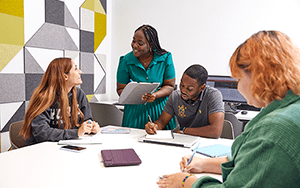
Performance Measurement Systems
Course Director: Marcela Porporato
In partnership with Universidad Nacional de Cordoba, Argentina
Course Description: This course provides an overview of performance measurement and incentive systems (PMIS) used by companies; improves students’ understanding of management behaviour related to PMIS; presents examples of financial and non-financial PMIS; provides students with opportunities to develop a PMIS; and make students aware that any accountability, oversight and governance mechanism is based on a set of performance measures designed by managers and directors.
GNL Components: On an individual basis, students are required to upload a word document in the course web site in Moodle. In preparation for each class, students will write a summary including a personal opinion of the material read for the day. The first paragraph shall be a personal opinion of the main ideas and conclusions achieved after reading the assigned material for the day. Each of the following paragraphs can summarize ideas or each element read for the day. Groups of 3 to 4 students are required to upload a document in the course web site in Moodle. Classes rely on their preparation to find real applications of the topics that might inform some class discussions. During the course the students will be constantly linking concepts from the book and other readings with real business situations. In most weeks the activity only requires finding an example from public sources (internet) while in others the activity requires students to prepare a short report.
Intermediate Written Communication in Japanese
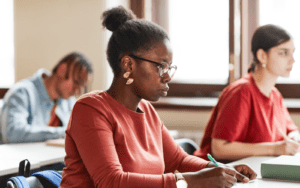
Intermediate Written Communication in Japanese
Course Director: Akiko Mitsui
In partnership with Hitotsubashi University, Japan
Course Description: The goal of the GNL project is to share ideas on topics students are interested in, using written Japanese, to obtain new perspectives on them through communication, and to reflect on the issues from new perspectives. At the same time, York students will learn the language with the specific genre for communication in Japanese as their target language in written forms, such as giving comments, e-mail messages and short opinion pieces in culturally specific and appropriate manners with students in the partner school, using on-line platforms.
GNL Components: York students write descriptions about themselves and their life and write short opinion essays, and Hitotsubashi (partner school) students read them and give comments on their content (not language errors) in Japanese, via Google docs or other online platform, considering York students’ proficiency level. When York students write, as part of media literacy, they are encouraged to provide a couple of photos to illustrate their writing effectively. There are 5 Google docs for each team (cohort of 6-7 York and Hitotsubashi students), so that they can post more privately. York students also write a response to the comments they receive. This activity/sequence could repeat bi-weekly during the semester. This year, they created short videos to introduce themselves and posted them on the Padlet. A couple of Hitotsubashi students joined in this activity.
Summer 2023
Collaborative Online International Learning Virtual Exchange (COIL-VE)

Collaborative Online International Learning Virtual Exchange (COIL-VE)
Course Director: Hugo Chen
In partnership with Northeastern University, China
Course Description: This is a staff lead initiative - led by Hugo Chen, Director of International Collaborations and Partnerships, and supported by GLYS members. Due to the pandemic, universities worldwide have increased their activity around VE. The Science COIL-VE allows science students to engage in a cross-cultural learning experience through online discussions, virtual collaborations and shared study life during the pandemic & post-pandemic. Students will explore different perspectives and approaches to various topics with peers from other countries and cultures. About GLYS Global Leaders of York Science (GLYS) aims to provide undergraduate students with professional development opportunities to enhance their employability skills and help them develop a global mindset. GLYS is a volunteer team that works closely with the Office of International Collaborations and Partnerships (OICP), supporting international initiatives at York Science.
GNL Components: The Science COIL-VE allows science students to engage in a cross-cultural learning experience through online discussions, virtual collaborations and shared study life during the pandemic & post-pandemic. Students will explore different perspectives and approaches to various topics with peers from other countries and cultures.
Fall/Winter 2022-23
Hispanic Geopoetics

Hispanic Geopoetics
Course Director: Alejandro Zamora
In partnership with Universidad del Magdalena, Colombia
Course Description: This project-based course centres on the study of the perception, representation and mapping of space in and through literature. Adopting a case-study approach, it focuses on a specific work and author, and furthers its investigation through a fieldtrip to a place relevant to the examined literature. The selected literary work is therefore studied both as a primary source to reflect about place, space, and other categories, and as a method of spatial, in-situ exploration.
GNL Components: This course explores the local geographies and oral heritage in the Colombian Caribbean that populated the imagination and generated the particular language of Gabriel García Márquez. Students further explore this aspect during a fieldtrip to the region. Being a Hyflex course, it is attended as well by 7 students from the Universidad del Magdalena (in the Colombian Caribbean), who also met with our students and participated in all the activities of their fieldtrip.
Learn more about Alejandro’s project: https://yorku.zoom.us/rec/share/VC9C6-BdWxMShUp29cHAf2z6PnhLlb2T-BNx0WXxeV867AcHkTtrcpTllNYyxgET.OYUs7Lkd6KGett9s?startTime=1682535787000
Graduate Studies Preparation Program (GSPP)

Graduate Studies Preparation Program (GSPP)
Course Director: Francesca Boschetti
In partnership with Pontificia Universidad Catolica Madre y Maestra, Dominican Republic
Course Description: The Graduate Studies Preparation Program (GSPP) is a language intensive preparation program offered by York University’s English Language Institute at the School of Continuing Studies. It provides students interested in pursuing graduate studies in North-America with academic English language training and graduate application coaching. GSPP students are also coached on how to thrive in graduate school, with a concentration on skills development (oral and written academic communication skills, research skills, critical thinking skills, professionalism).
GNL Components: This GNL project encompasses three key components: Firstly, asynchronous ice-breakers facilitate student introductions in the partner institution, fostering a sense of connection. Secondly, students engage in teamwork, either in pairs or mini-groups, collaborating on a shared objective, such as creating a presentation. Lastly, the project concludes with a final synchronous session, providing an opportunity for real-time interaction and reflection. These components collectively aim to enhance intercultural understanding and collaboration among participating students.
The International Refugee Protection Regime II: Research Seminar

AP/PPAS 4112 3.0 and GS/PPAL 6040 3.0
Course Director: James C. Simeon
In partnership with Tecnologico de Monterrey, Mexico
Course Description: Using multi-disciplinary analytical perspectives, the current state of the international refugee protection regime will be examined to reveal the underlying forces and dynamics at the root of the critical problems and the probable solutions facing those seeking international protection.
GNL-Components: Students will be able to have a better appreciation and understanding of the refugee and migration issues and concerns internationally as well as, specifically, in three countries: Canada; Mexico; that is, from North America and, South America. Students will be able to work with students from different countries on various critical issues facing refugees and other forced migrants and in the process further develop and hone their problem-solving skills.
Collaborative Student Outputs:
Check out how it went!
Enquête sur les systèmes éducatifs francophones
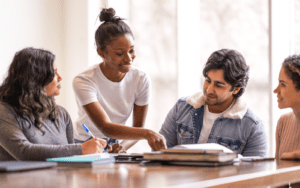
Enquête sur les systèmes éducatifs francophones
Course Director: Muriel Peguret
In partnership with Universite D'Orleans, France
Course Description: L’objectif est de faire l’expérience des différences culturelles dans le monde de l’éducation de divers pays ou diverses régions de la francophonie sans quitter Toronto. Cette année le DEF a un partenariat avec la France (Université d’Orléans). Les étudiant.e.s du cours au DEF et à l’Université d’Orléans sont lancé.e.s ensemble dans une enquête active et interactive pour observer, dialoguer, comparer, créer collaborativement et analyser les différences d’approches éducatives. L’étudiant va développer ses compétences de communication en français à l’écrit et à l’oral, ses compétences interculturelles (l’aptitude à interagir avec différentes cultures, l’empathie, la capacité d’adaptation), ses connaissances des politiques éducatives et indirectement sa compréhension de l’internationalisation de l’éducation. Tout ceci se fera dans un cadre favorisant la détente, l’interaction, le partage, la discussion et la collaboration. Quelques exemples de thèmes abordés seront : les chocs culturels, les attentes pédagogiques, la façon de communiquer, les notions de diversité, équité et inclusion, les standards éthiques.
GNL Components: Comparisons based on different themes (equity, FSL teaching, school structures, etc.) Final Task group work : planning an FSL lesson together written synthesis of ideas and translation work personal written reflection.
Intermediate Written Communication in Japanese
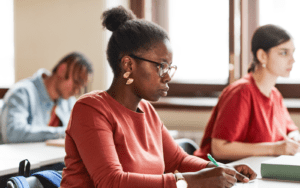
Intermediate Written Communication in Japanese
Course Director: Noriko Yabuki-Soh
In partnership with Hitotsubashi University, Japan
Course Description: This course is intended for students with basic knowledge of structures and writing systems of Japanese who wish to advance their skills by engaging in communication with the Japanese-speaking community outside of the classroom context, using on-line platforms.
GNL Components: This project is part of the JP2010 course curriculum. Students work on a bi-weekly assignment on a topic to be communicated in written form with students in our partner school in Japan (i.e., Hitotsubashi University), based on the class discussion covered during that week. Students are required to record their work as a form of portfolio, revise it based on the instructor's feedback, and upload it on Google Docs. York students then further respond to the comments that they received from Hitotsubashi students. Each activity will take place as class-to-class, group-to-group, or one-to-one communication based on the topic of discussion.
Learn more about Noriko’s project: https://yorku.zoom.us/rec/play/EHkEa1J0GcPxwGraRLzMocxWA6NYQNIu0AKwJayoxY-k5WSsDqcBlASRlvy9Rd7dZ58PB_zcl5b1zxYR.3rzv9myFnC-K9T2A?autoplay=true&startTime=1683986157000
Winter 2022
Sustainable Design in Performance & Independent Production Practicum
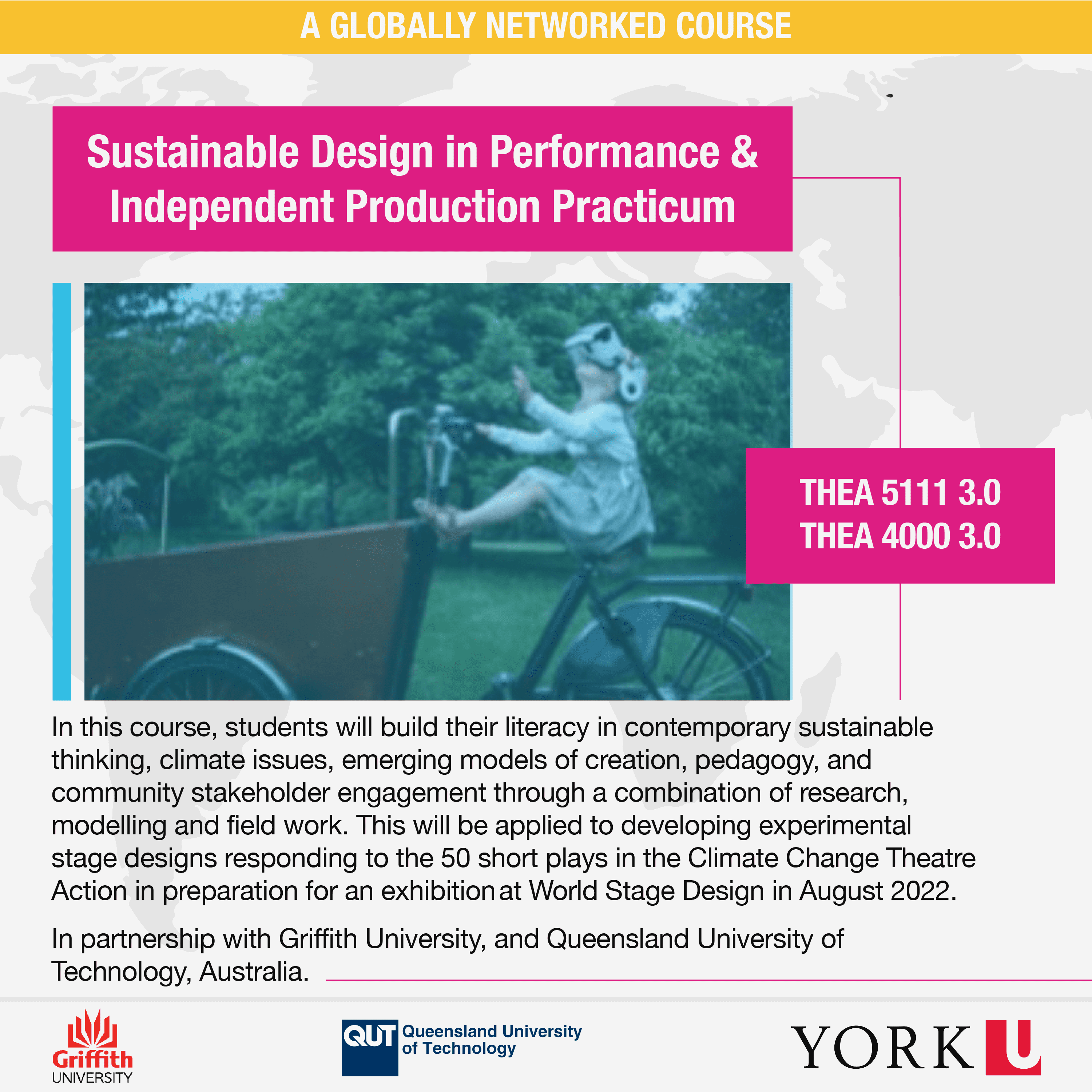
THEA 5111 3.0 & THEA 3000
Course Director: Ian Garrett
In partnership with Griffith University, and Queensland University of Technology, Australia
Course Description: In this course, students will build their literacy in contemporary sustainable thinking, environmental/climate issues, emerging models of creation, pedagogy, and community stakeholder engagement through a combination of research, modelling and field work as strategic change agents in professional settings. This will be applied to developing experimental stage designs responding to the 50 short plays in the Climate Change Theatre Action in preparation for an exhibition at World Stage Design in Calgary, August 6 - 16, 2022. The course will primarily meet in the evenings on Mondays after the Fall Reading week in the York Term , and then pick-up after the Winter Break to finish before the Winter Reading week, after which students may continue to prepare their work for exhibition leading up to World Stage Design in Calgary.
Traveling to Calgary is not a requirement of the course.
GNL Components: Students will create collaborative scenography projects with their peers in Griffith University and Queensland University of Technology, and then organize the exhibition and performance of performance projects at an international festival.
Spanish Linguistics
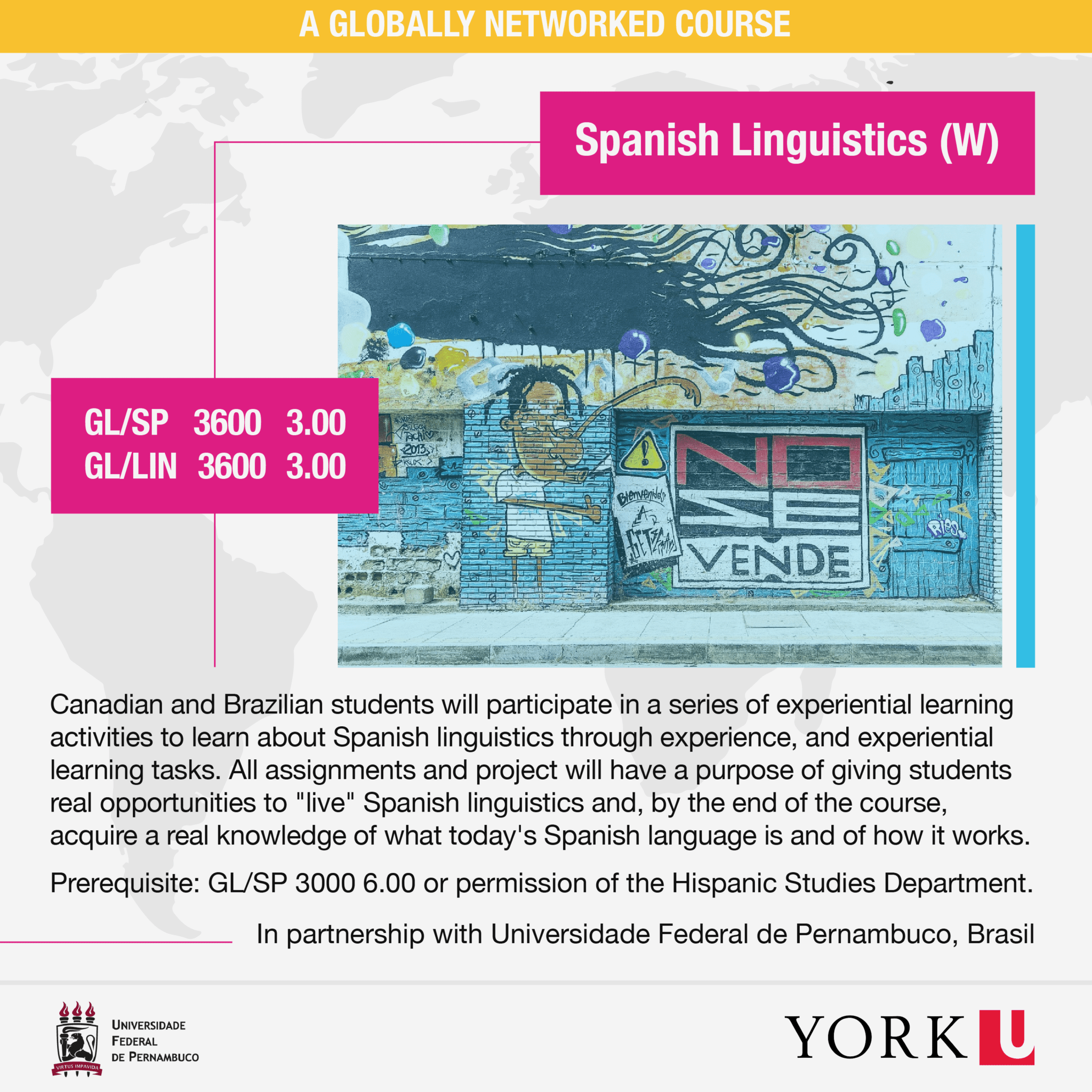
GL/SP 3600 3.00 (Winter 2021)
Course Director: Jerzy Kowal
In partnership with Universidad Federal de Pernambuco, Brasil.
Course Description: This course will examine the linguistic structures of the Spanish language: its sound system (phonetics and phonology), its word formation morphology), sentence structure (syntax) and varieties of Spanish (historical, social and regional).
GNL Components: The courses will consist or 12 weeks of interactive lectures, where students will participate in a series of experiential learning activities to learn about Spanish linguistics through experience, and experiential learning tasks. Furthermore, all assignments and project will have a purpose of give students real opportunities to "live" Spanish linguistics and, by the end of the course, acquire a real knowledge what is today's Spanish language and of how it works.
The International Refugee Protection Regime II: Research Seminar
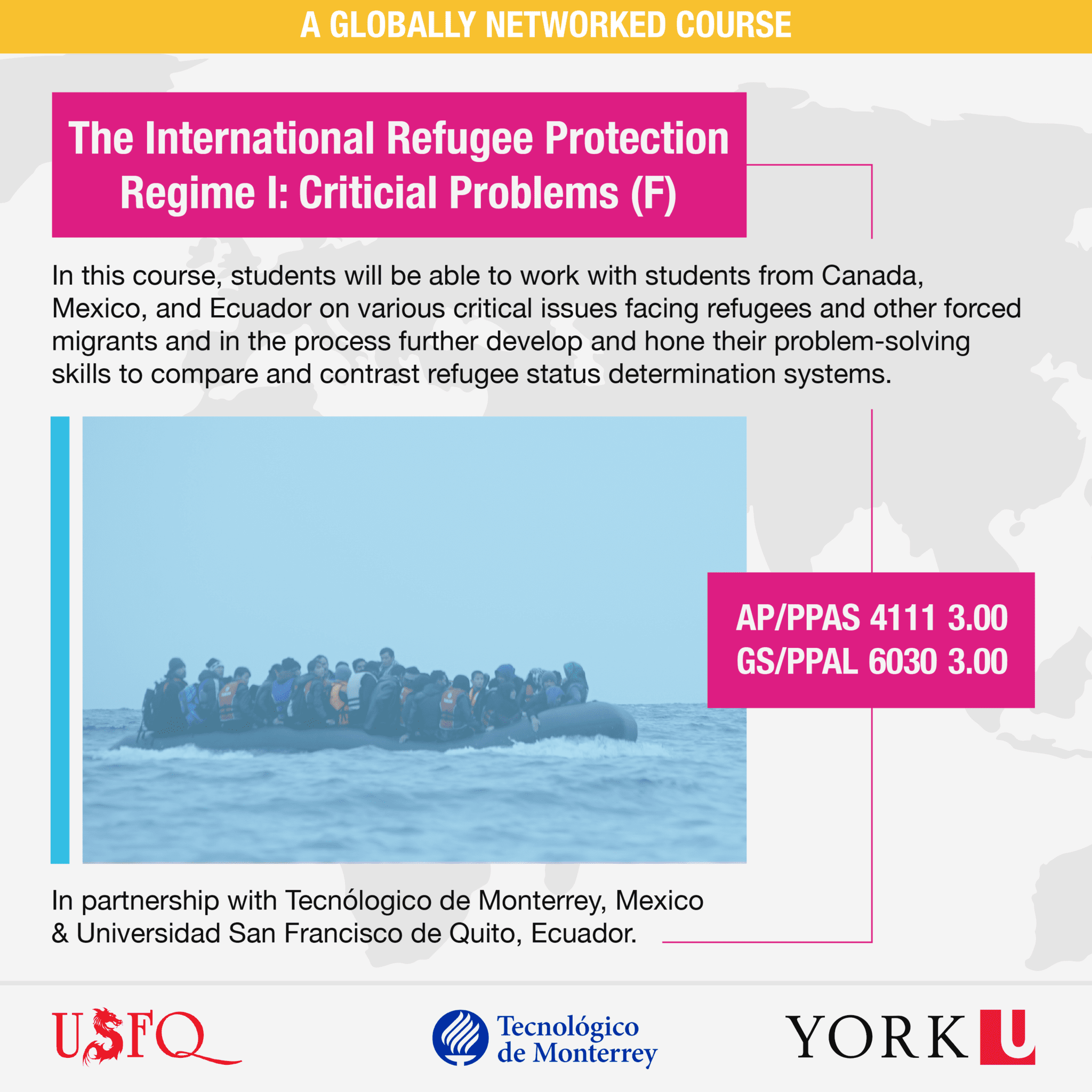
AP/PPAS 4112 3.0 and GS/PPAL 6040 3.0
Course Director: James C. Simeon
In partnership with Tecnologico de Monterrey, Mexico
Course Description: Using multi-disciplinary analytical perspectives, the current state of the international refugee protection regime will be examined to reveal the underlying forces and dynamics at the root of the critical problems and the probable solutions facing those seeking international protection.
GNL-Components: Students will be able to have a better appreciation and understanding of the refugee and migration issues and concerns internationally as well as, specifically, in three countries: Canada; Mexico; that is, from North America and, South America. Students will be able to work with students from different countries on various critical issues facing refugees and other forced migrants and in the process further develop and hone their problem-solving skills.
Collaborative Student Outputs:
Check out how it went!
Global Health Practicum
HH/IHST 4300 3.00 (Winter 2021)
Course Director: Dr. Mathieu Poirier
In partnership with Universidad Técnica Nacional, Costa Rica.
Course Description: Designed to bridge theory and practice in a variety of health settings, the Practicum is a 250-hour planned, supervised and evaluated research and practice based experience in which students are mentored and supported by qualified supervisors and faculty. The course also includes seminars and reflective and applied assignments. Prerequisites: All 3000 & 4000 courses in the program except for HH/IHST 4400 3.00. Open to: Global Health majors.
GNL Components: The Grounded Project brings awareness to issues concerning environmental sustainability, biodiversity conservation, health, and human well-being in Costa Rica through the creation of a series of documentary films spotlighting rural community lives. Through ethnographic research and grounded theory approach, field teams will record interviews with stakeholder community members, uploading footage to a virtual platform where York students and Costa Rican partners will collaboratively explore themes and issues raised as the foundation for film creation.
Graduate Studies Preparation Program
GSPP (Graduate Studies Preparation Program)
Course Director: Francesca Boschetti
Course Description: The Graduate Studies Preparation Program (GSPP) is a language intensive preparation program offered by York University’s English Language Institute at the School of Continuing Studies. It provides students interested in pursuing graduate studies in North-America with academic English language training and graduate application coaching. GSPP students are also coached on how to thrive in graduate school, with a concentration on skills development (oral and written academic communication skills, research skills, critical thinking skills, professionalism).
Virtual Journal Club
Virtual Journal Club
Course Director: Dr. Claudia Chaufan
Course Description: The goal of this Virtual Journal Club is to expose participants to a broader view of the relationship between health equity and social justice in Cuba, thus expanding their perspectives on comparative health policy as a field of intellectual inquiry and policy practice. This will include engaging students with perspectives that are rarely discussed in the mainstream, as they engage with cutting-edge research on the subject matter, discussion and debate among participants, and opportunities to interact with researchers themselves.
GNL Components: Students in the Virtual Journal Club will gain international global knowledge, skills, and attitudes by virtue of the very nature of the activity, that necessitates their engagement with knowledge about the complexity of a country with a very distinct cultural, social, and political tradition, as they interact within the Club with students from very different cultures. These activities are expected to impact their attitudes towards other cultures that very often are stereotyped in mainstream sources. I am very confident about the likelihood of success because I have taught at the university level in four different countries and in classes with students from widely different backgrounds, not only in Canada but also in the Republic of China.
Social Construction of Girls and Girlhood: Critical Feminist Perspectives
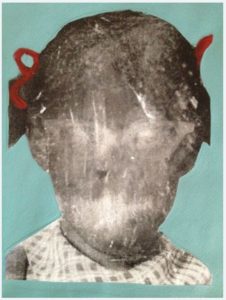
Deborah Roberts, "Black Girlhood"
GS/GFWS 6906 3.0
Doctoral Program of Gender, Feminist and Women’s Studies at York University
The Social Construction of Girls and Girlhood: Critical Feminist Perspectives
Course Director: Dr. Cheryl van Daalen-Smith
with Dr. Sharmila Parmanand, Department of Women and Development Studies, College of Social Work and Community Development, University of the Philippines, Diliman campus
Course Description: Drawing upon multiple theoretical perspectives from contemporary girlhood studies, students will explore the cultural and social construction of “the girl”, girls and girlhood. Critical feminist perspectives and analyses combined with “girls’” own experiences, enable students to uncover the ways in which girlhood, and by default enforced yet devalued femininity, is both socially constructed and regulated through time, place and space. The course strives to facilitate the enjoyment of deep reading and scholarly debate on a variety of topics relating to girls and girlhood where the role of oppression will be explored through a critical, feminist and intersectional lens. Through the physical and emotional manifestations of girlhood as experienced and told by “girls” themselves, students develop an awareness of the connections between the personal and social relations of power as they relate to lived experience, identity construction, subjectification and resistance. Readings, facilitated discussions both online and in class, together with learning evidences enable students to challenge and interrogate how gender, race, class, ability, colonization, and the regulation of girls’ bodies, minds and desires collude to enforce the societal enforcement of normalcy, criminality, sanity, etc. Through deep reflection and critical discourse analysis, what we think we “know” about girls and girlhood as an identity category is interrogated, critiqued and deconstructed.
GNL Components:The GNL components included guest lectures provided by both professors to their respective peer’s class, and a shared field trip assignment involving students in pairs, virtually visiting with a girl-serving organization in Canada or the Philippines in order to understand the pressing issues facing girls and the ways girl-serving professionals are constructing support and intervention. A closing combined class will enable students to share the insights gained in their respective field trips, and to engage in discussion regarding similarities and differences in the issues facing girls and the ways that support is provided.
Fall 2021
Digital Media Program: Directed Reading in Data Telematics
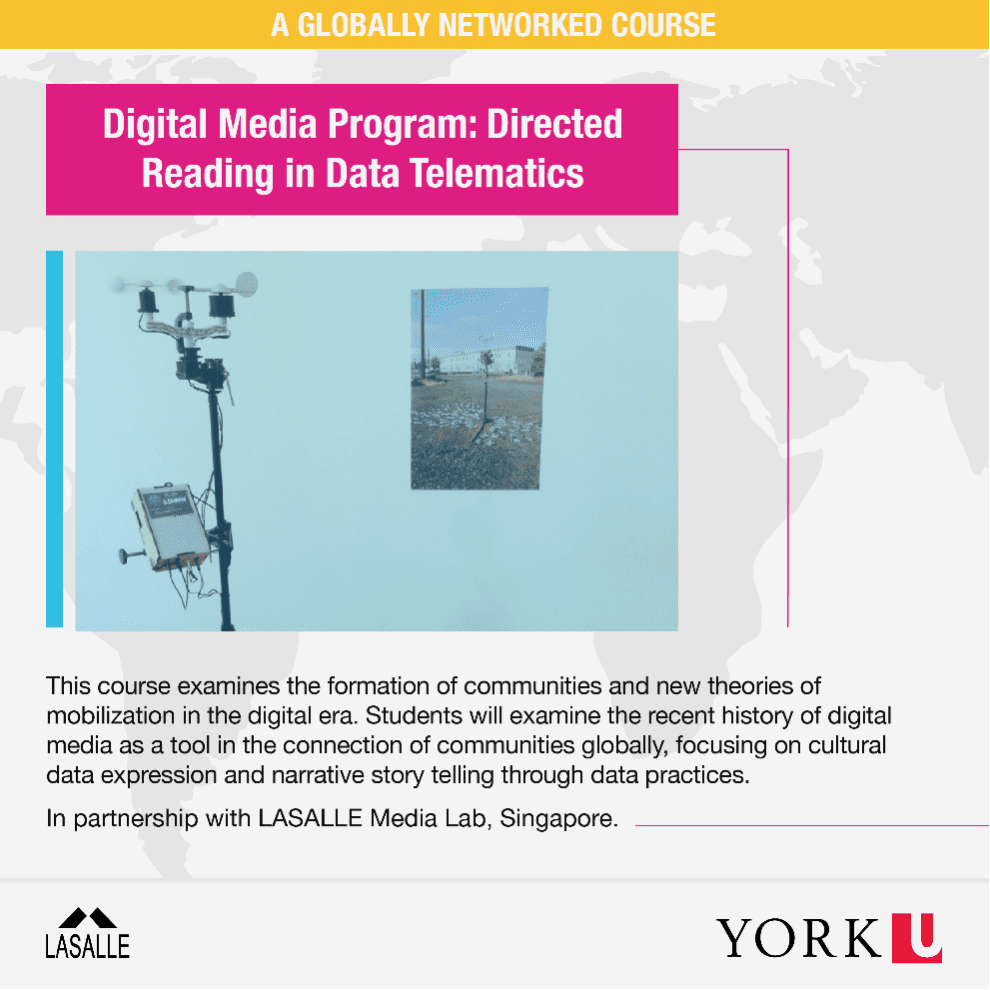
Course Director: Joel Ong
In partnership with LASALLE Media Lab, Singapore.
Course Description: This course examines the formation of communities and new theories of mobilization in the digital era. Students will examine the recent history of digital media as a tool in the connection of communities globally, focusing on cultural data expression and narrative story telling through data practices.
GNL Components: Students will work with Lasalle Media Lab to think about how to collect, consider and critically evaluate data to develop multi-cultural digital media content. Then over the semester, students will work in teams to co-create digital media expressions and display their projects in a public showcase.
Health and Healing: Global Context of Nursing
HH/NURS 4546
Course Director: Sandra Skerratt
In partnership with Oxford Brookes University (UK) NUTR6003 Global Nutrition, Public Health and Policy
Course Description: This course analyzes the influence of upstream political, social and economic forces on health status and health care, including health disparities, inequities and environmental degradation. Focusing on the nursing role, present and future scenarios threatening individual, population and planetary health will be examined to critically and reflectively consider social responsibilities and actions.
GNL Components: Students from undergraduate nursing and nutrition programs in different geographical locations will engage in dialogue to compare interdisciplinary perspectives on nutritional issues specific to global populations.
International Indigenous Peer-to-Peer Virtual Exchange Program
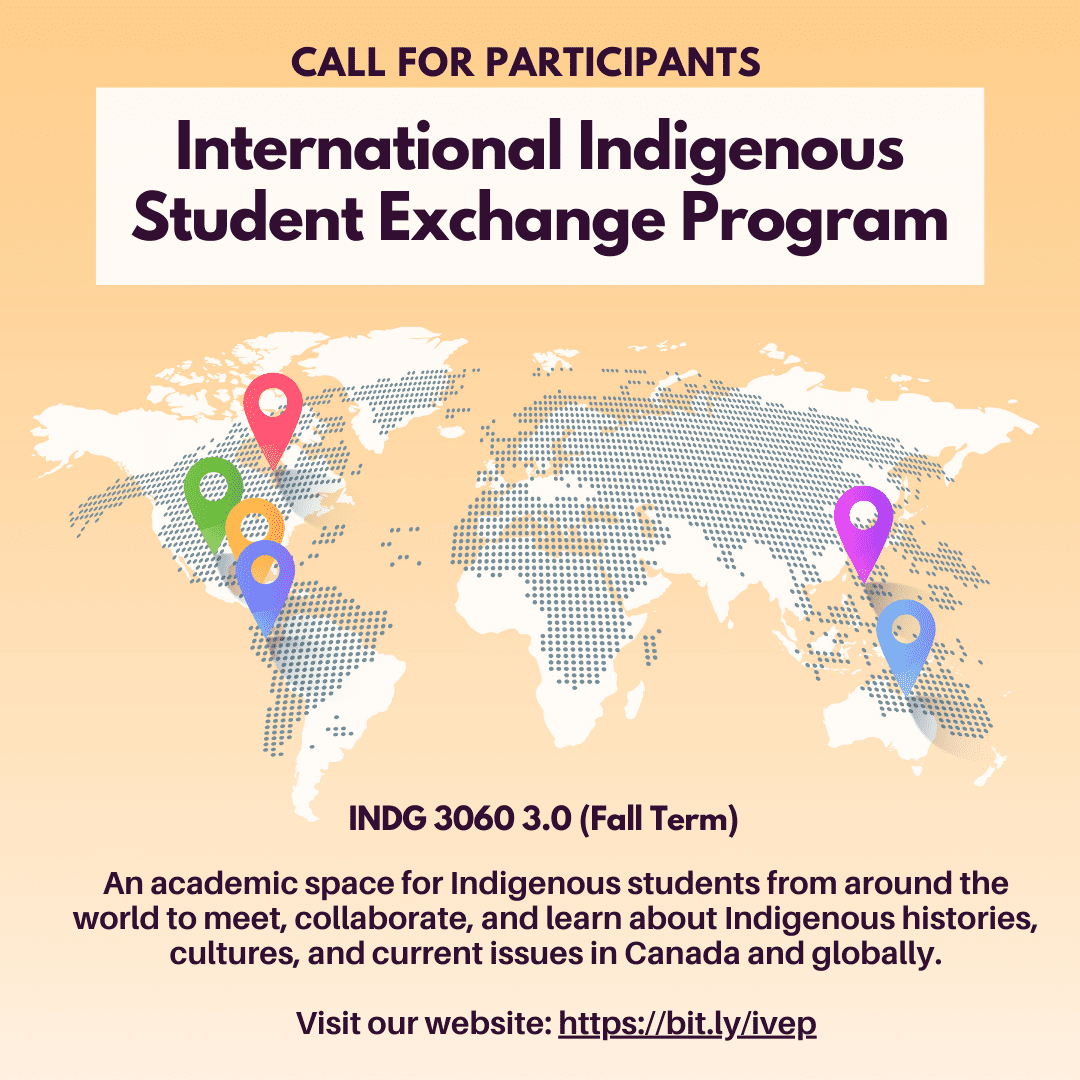
Fall 2021
Course Director: Dr. Carolyn Podruchny
Program Description
The program provides opportunities for dialogue and collaboration between Indigenous students at York University and their Indigenous student peers located in Australia, Costa Rica, Ecuador, Mexico, and the Philippines. The goal is to facilitate connections among Indigenous students around the world and share knowledge and experiences.
GNL Components: Faculty leads are hosting 12 facilitated virtual workshops on Zoom on a variety of themes surrounding Global Indigeneity, including knowledge, spirituality, political movements, communication, land, food, and identity. Participating students will also be producing a culminating project to reflect their learnings to be displayed at a Public Forum in December.
To learn more, visit the Program Website.
The International Refugee Protection Regime I: Critical Problems

AP/PPAS 4111 & GS/PPAL 6030 3.0
Course Director: James C. Simeon
In partnership with Tecnologico de Monterrey, Mexico, The Universidad San Francisco de Quito, Ecuador, Northwestern University, Evenston, and Illinois, USA,
Course Description: Using multi-disciplinary analytical perspectives, the current state of the international refugee protection regime will be examined to reveal the underlying forces and dynamics at the root of the critical problems and the probable solutions facing those seeking international protection.
GNL-Components: Students will be able to have a better appreciation and understanding of the refugee and migration issues and concerns internationally as well as, specifically, in three countries: Canada; Mexico; and, Ecuador; that is, from North America and, South America. Students will be able to work with students from three different countries on various critical issues facing refugees and other forced migrants and in the process further develop and hone their problem-solving skills.
Collaborative Student Outputs:
Check out how it went!
Social Justice Nursing: Philosophies and Practices
GS/NURS 7045 3.00
Course Director Dr. Cheryl van Daalen-Smith
In partnership with Brookes University, United Kingdom.
Course Description:
Nursing’s legacy in addressing issues of social justice is well documented and extends far beyond individual patients and the care they deserve to include structural, governmental, political, environmental, monetary, and planetary concerns. Doctoral nursing students are guided to develop structural competency through the examination of health equity, rights, justice, oppression, neoliberalism and the social determinants of health. Facilitators and barriers to critical social justice nursing and the requisite advocacy efforts are explored.
GNL Components: Grounded in student-driven cross-cultural dialogue, students will discuss key issues Canadian and British nurses are taking up in so far as social justice. Partners will provide evidence of the uptake of this issue by nurses in their respective country. Discussion regarding enablers and barriers to social justice work for nurses is to be co-facilitated. A reflective and concise reflective paper and brief presentation shall round out the GNL experience.
Methodology of Spanish-English Translation 1
GL/SP 4910 3.00
Course Director Dr. Maria Constanza Guzman
In partnership with Universidad del Magdalena, Colombia.
Course Description:
This course provides intensive practice translating pragmatic texts from various domains. Conceptual and methodological tools from translation studies and applied linguistics are intended to teach students to analyze texts and plan and carry out a variety of translation projects.
GNL Components:
In this course, students will learn how to describe local linguistic landscapes. Throughout this course, students will work together and create a presentation about their linguistic landscape and the impact on the social and professional activities in their context.
Philippine Folk Dance
FA/DANC 2510F 3.00
Course Director: Dr. Patrick Alcedo
In partnership with University of the Philippines Diliman, Philippines.
Course Description:
Introduces students to selected Philippine folk dances. The effects of colonialism, plurality of Filipino culture, and contemporary changes on these art forms are examined as well.
GNL Components:
The students at York and the University of the Philippines will have to learn by heart two folk dances, record on video their performances of these dances in costumes/regalia and using appropriate props if needed and have discussions about their cross-cultural engagements. Both the pre-recorded performance and their insights into collaborating with each other will be their final project for the course.
Place and Learning
EDST 1200
Course Director: Patrick Darkhor
In partnership with Pontificia Universidad Católica Madre y Maestra, Dominican Republic.
Course Description:
In this course we emphasis on collaborative and community-oriented learning as an effective pedagogical approach that addresses critical issues related to the role of higher education in fostering responsible citizenship and social responsibility. Central to this course is the study of the role of community and physical spaces in learning.
GNL Components:
Students from both courses will: Participate in cross-cultural student dialogues. Collaborate on knowledge-exchange process and research projects. Gain diverse perspectives on community health issues that matter to them most. Students will engage in virtual dialogue to exchange ideas about community health issues and how to promote health education in the community where the live. Students will discuss health promotion initiatives and listen to each other's opinions through conversations that facilitate understanding of what and how a community health promotion project can be planned and achieved.
Virtual Journal Club
Virtual Journal Club
Course Director: Claudia Chaufan
Course Description
The goal of this Virtual Journal Club is to expose participants to a broader view of the relationship between health equity and social justice in Cuba, thus expanding their perspectives on comparative health policy as a field of intellectual inquiry and policy practice. This will include engaging students with perspectives that are rarely discussed in the mainstream, as they engage with cutting-edge research on the subject matter, discussion and debate among participants, and opportunities to interact with researchers themselves.
GNL Component
Students in the Virtual Journal Club will gain international global knowledge, skills, and attitudes by virtue of the very nature of the activity, that necessitates their engagement with knowledge about the complexity of a country with a very distinct cultural, social, and political tradition, as they interact within the Club with students from very different cultures. These activities are expected to impact their attitudes towards other cultures that very often are stereotyped in mainstream sources. I am very confident about the likelihood of success because I have taught at the university level in four different countries and in classes with students from widely different backgrounds, not only in Canada but also in the Republic of China.
Fall/Winter 2021-22
Global Health Policy: Power and Politics
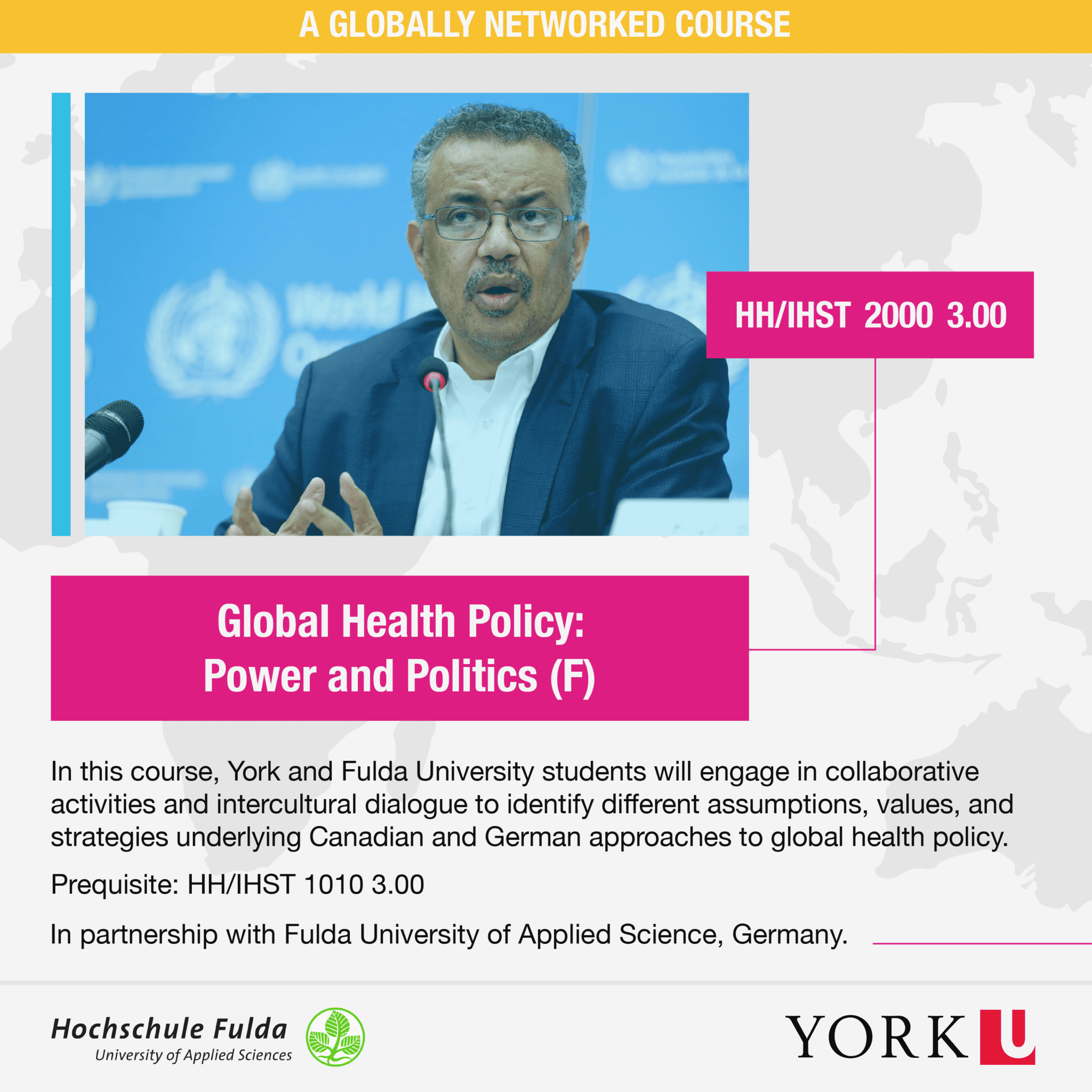
IHST 2200 (Fall/Winter 2021-22)
Course Director: Mathieu Poirier
In partnership with Fulda University of Applied Sciences, Germany.
Course Description: Analyzes the process through which global health policy is developed. As national and global initiatives can intertwine, the course begins by exploring and categorizing the manner in which nation governments are structured, and the factors that influence the process of policy decision-making at the national and global levels. Explores case studies that demonstrate global health policy development. Prerequisite: HH/IHST 1010 3.00
GNL Components: Each of the three course directors (one at York and two at Fulda) will create asynchronous guest lectures accessible to co-learners in both universities focusing on a global health policy topic that draws on their expertise and research area. Group discussion activities will be assigned for every co-learning week to foster intercultural dialogue identifying different assumptions, values, and strategies underlying Canadian and German approaches to global health policy. Finally, an international collaborative group project will allow students from both universities to work together to produce an tangible product focused on a specific aspect of global health policy response to COVID-19, drawing on both their lived experiences in Germany and Canada and the shared lecture content.
yFile: York University's News | Published April 7, 2021 Global Health students meet and collaborate with European peers through GNL
Economics Virtual Journal Club
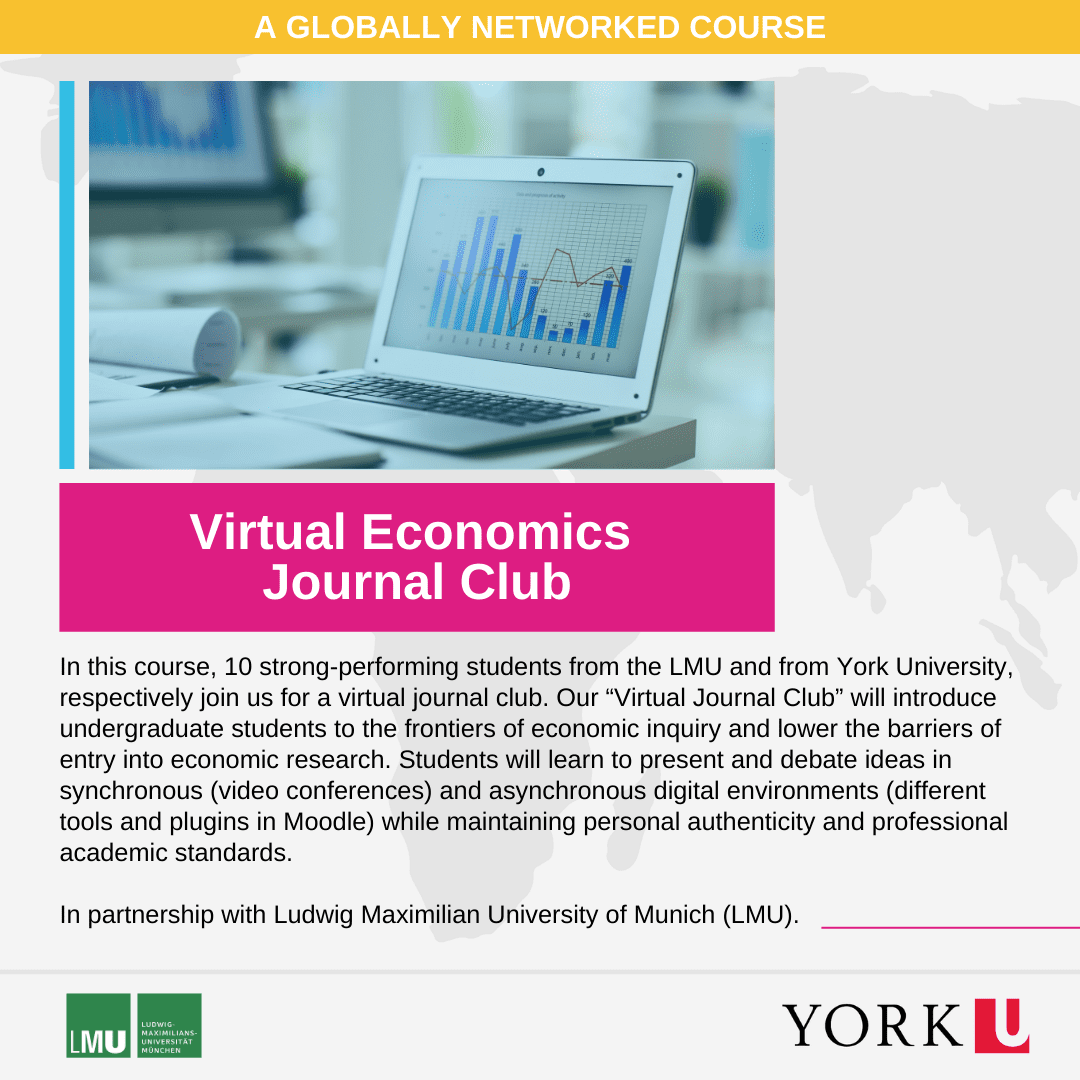
Fall/Winter 2021-22
Course Director: Karen Bernhardt-Warner
In partnership with Ludwig Maximilian University of Munich (LMU)
In this course, 10 strong-performing students from the LMU and from York University, respectively to join us for a virtual journal club. The “Virtual Journal Club” will introduce undergraduate students to the frontiers of economic inquiry and lower the barriers of entry into economic research. Students will learn to present and debate ideas in synchronous (video conferences) and asynchronous digital environments (different tools and plugins in Moodle) while maintaining personal authenticity and professional academic standards.
Communication, Health, and Environment
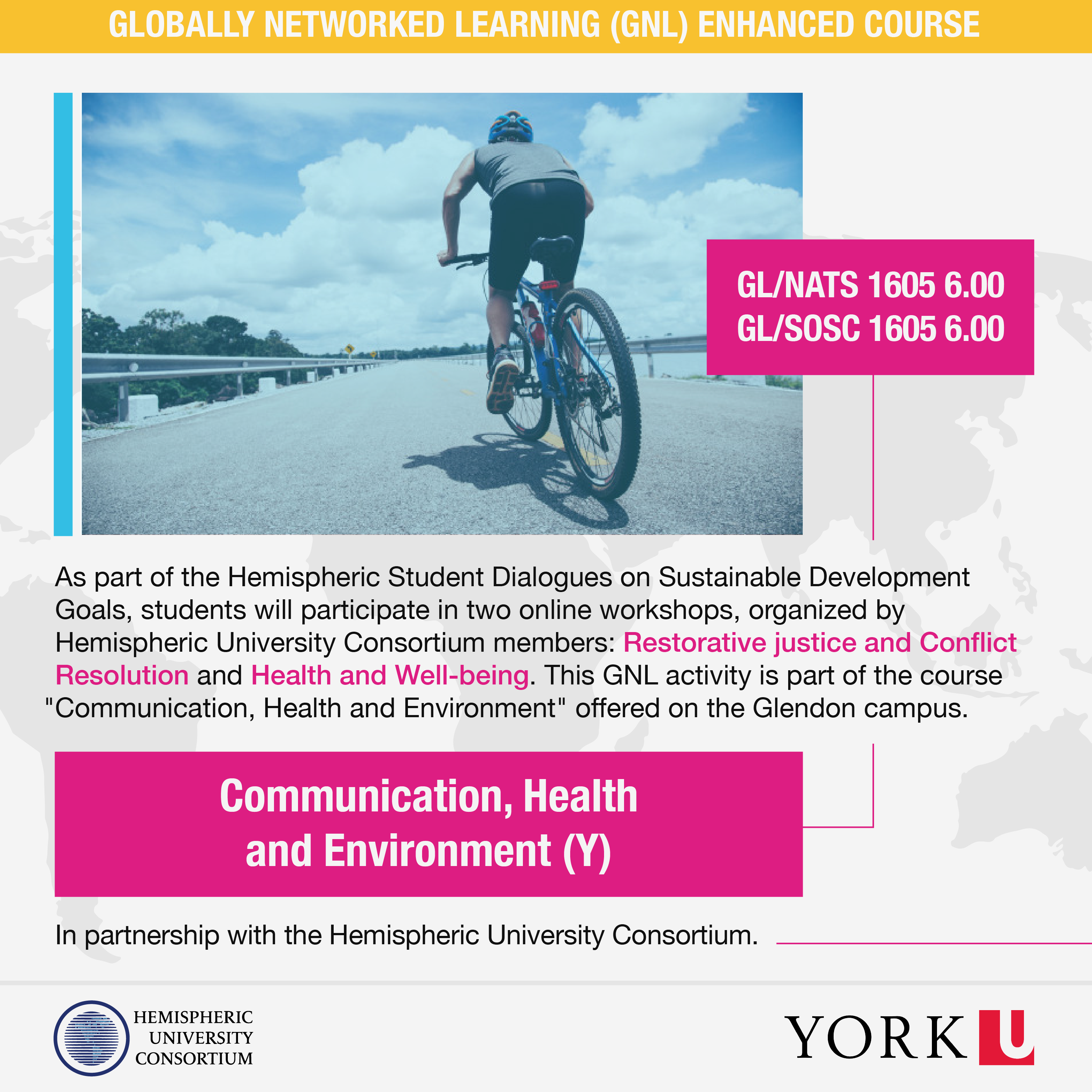
NATS/SOSC 1605 6.0 (Fall/Winter 2021-22)
Course Director: Charles-Antoine Rouyer
In partnership with Universidad San Francisco de Quito (USFQ), Ecuador and Université Catholique de Lille, France.
Course Description: This course connects the three areas of communication, health and environment by exploring the interrelationships between human health and the health of natural and socio-economic environments. It also addresses the influence of mass communication in relation to public policy pertaining to human and ecosystem health. Throughout the course, the sustainability concept is used as a guiding principle.
GNL Components
Fall Term: Students will participate in Hemispheric Student Dialogues on SDGs hosted by the Hemispheric University Consortium and USFQ to explore the connection between natural sciences and social sciences when dealing with the Sustainable Development Goals.
Student Outputs: Showcase of Student Deliverables on SDG 3: Good Health and Well-Being
Winter Term: Canadian students will then work with French students during the early Winter 2021 term, to illustrate visually some of the key concepts studied. The deliverable will be a visual production, which could be part of a one day "Sustainability Festival” in Lille in late March.
Teaching English as an International Language
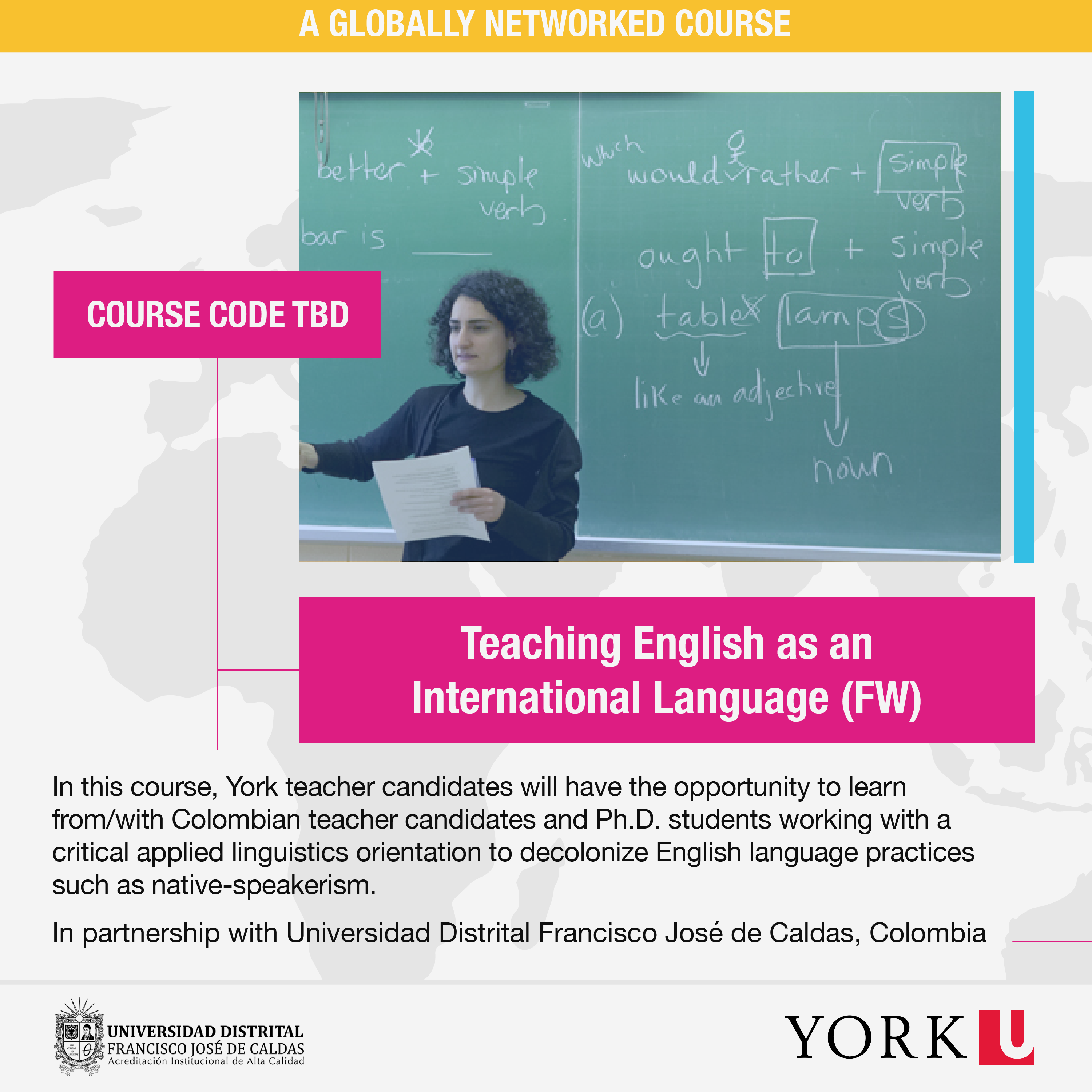
Fall/Winter 2021-22
Course Director: Marlon Cabrera Valencia
In partnership with Universidad Distrital Francisco José de Caldas, Colombia.
Course Description: The teaching and learning of English as an additional language has historically favored the (monolingual speaker-without interference from any other language) native speaker as the idealized model of language competency (AKA native speakerism).
GNL Components: In this course, York teacher candidates will have the opportunity to learn from/with Colombian teacher candidates and Ph.D. students working with a critical applied linguistics orientation to decolonize English language practices such as native-speakerism. There will also be a new practicum site where Canadian English-speaking student-teachers can learn from Colombian non-native speaker English teachers for their practicum.
Summer 2021
RealEngineering: Space Pilot Project
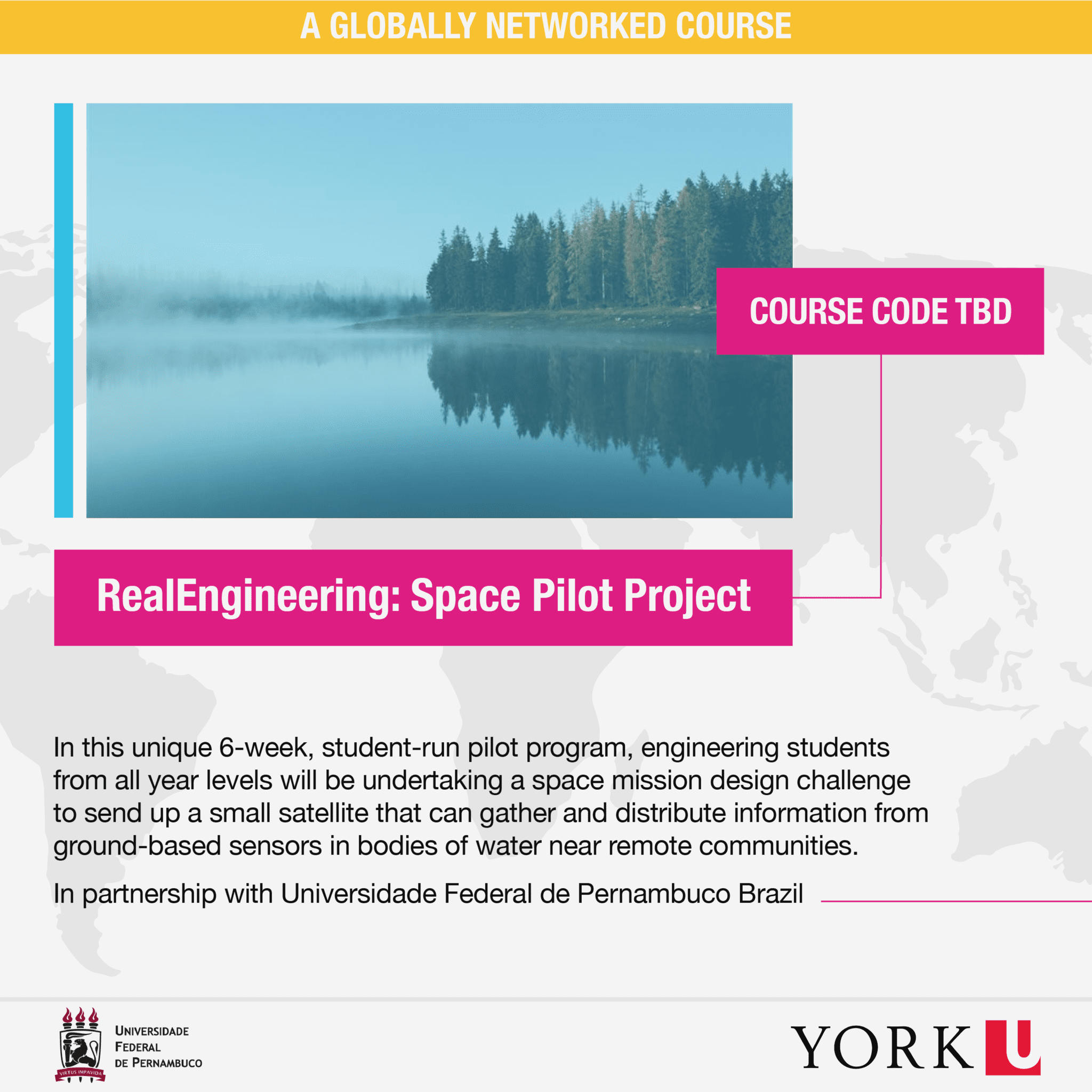
Course Director: Dr. Franz Newland
In partnership with Universidad Federale de Pernambuco, Brazil
Course Description: In this unique 6-week, student-run pilot program, engineering students from all year levels will be undertaking a space mission design challenge to send up a small satellite that can gather and distribute information from ground-based sensors in bodies of water near remote communities.
GNL Components: Students in this course will be consulting with peers in the ‘Digital Technologies in Health’ course to dialogue and understand the impact of water qualities both in Canada and the Amazon.
Read about how the GNL Project went on the Project Website.
Sustainable Staging Techniques & Independent Production Practicum
Course Director: Dr. Ian Garrett
In partnership with Griffith University, and Queensland University of Technology, Australia
Course Description: In this course, students will participate in a series of collaborative workshops on EcoScenography based on the Climate Change Theatre Action plays in an international remote studio in preparation for exhibition and presentation at the World Stage Design Festival in Calgary in August 2022
GNL Components: Students will create collaborative scenography projects with international partners, negotiate and translate designs ideas and projects for exhibition and presentation at an international festival, organize the exhibition and performance of performance projects at an international festival.
Canadian Children’s Health and Quality of Life: A Rights-Based Perspective
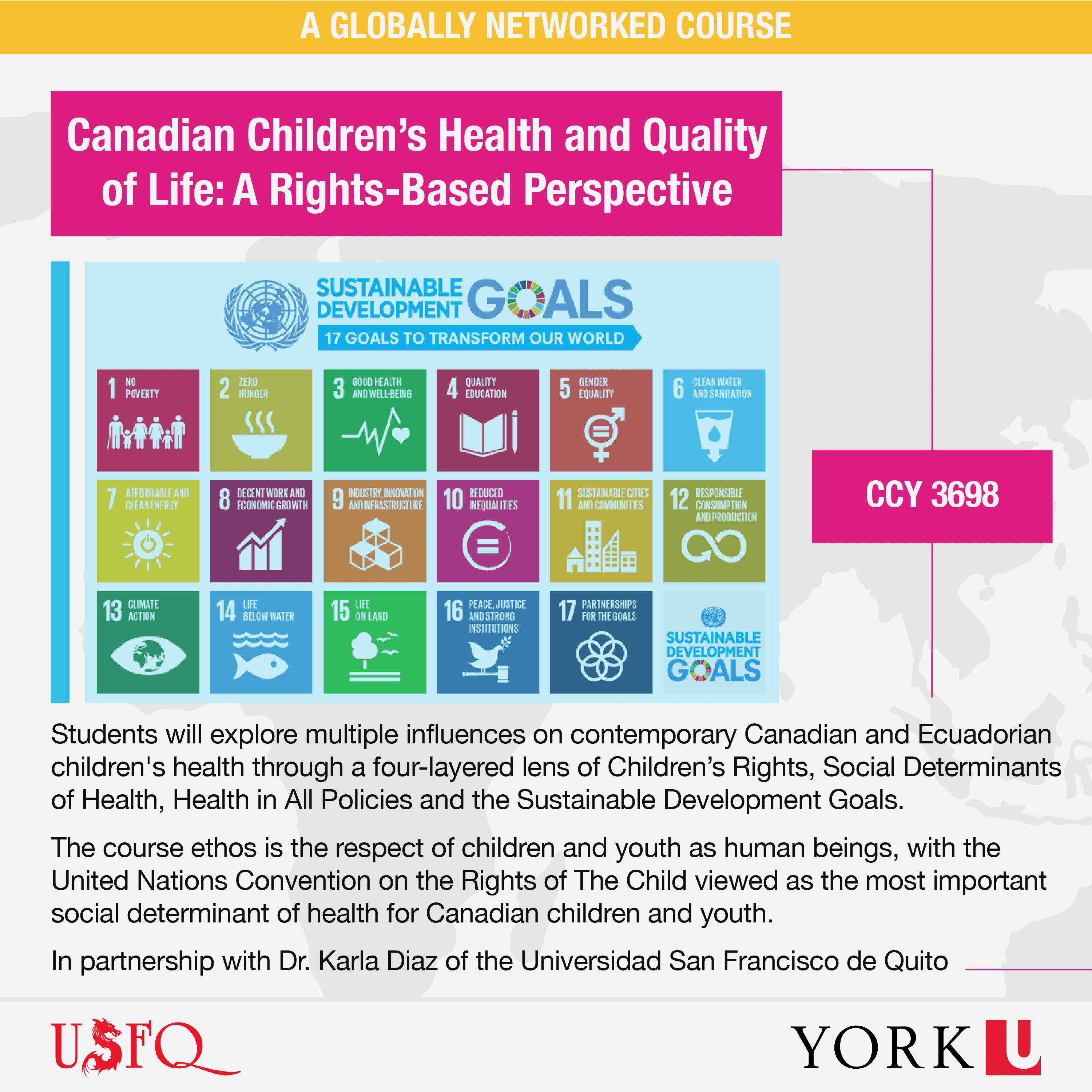
CCY 3698
Course Director: Dr. Cheryl L van Daalen-Smith of the Children, Childhood and Youth Studies Program
In partnership with Dr. Karla Diaz of the Universidad San Francisco de Quito.
Course Description: Students will explore multiple influences on contemporary Canadian and Ecuadorian children's health through a four-layered lens of Children’s Rights, Social Determinants of Health, Health in All Policies and the Sustainable Development Goals.
The course ethos is the respect of children and youth as human beings, with the United Nations Convention on the Rights of The Child viewed as the most important social determinant of health for Canadian children and youth.
GNL Components: York University students will be grouped with peers from USFQ’s ‘Service Learning’ course in Ecuador to compare perspectives and contexts on a chosen Sustainable Development Goal, in relation to Children’s Health. Students will then create INFOgraphics to display their findings, followed by a reflection on the differences and similarities regarding the SDGs and Children’s Health in their respective countries.
Fall 2020 / Winter 2021
Economics Virtual Journal Club

Fall/Winter 2021-22
Course Director: Karen Bernhardt-Warner
In partnership with Ludwig Maximilian University of Munich (LMU)
In this course, 10 strong-performing students from the LMU and from York University, respectively to join us for a virtual journal club. The “Virtual Journal Club” will introduce undergraduate students to the frontiers of economic inquiry and lower the barriers of entry into economic research. Students will learn to present and debate ideas in synchronous (video conferences) and asynchronous digital environments (different tools and plugins in Moodle) while maintaining personal authenticity and professional academic standards.
The International Refugee Protection Regime I: Critical Problems

AP/PPAS 4111 & GS/PPAL 6030 3.0
Course Director: James C. Simeon
In partnership with Tecnologico de Monterrey, Mexico, and the Universidad San Francisco de Quito, Ecuador.
Course Description: Using multi-disciplinary analytical perspectives, the current state of the international refugee protection regime will be examined to reveal the underlying forces and dynamics at the root of the critical problems and the probable solutions facing those seeking international protection.
GNL-Components: Students will be able to have a better appreciation and understanding of the refugee and migration issues and concerns internationally as well as, specifically, in three countries: Canada; Mexico; and, Ecuador; that is, from North America and, South America. Students will be able to work with students from three different countries on various critical issues facing refugees and other forced migrants and in the process further develop and hone their problem-solving skills.
Collaborative Student Outputs:
Check out how it went!
The International Refugee Protection Regime II: Research Seminar
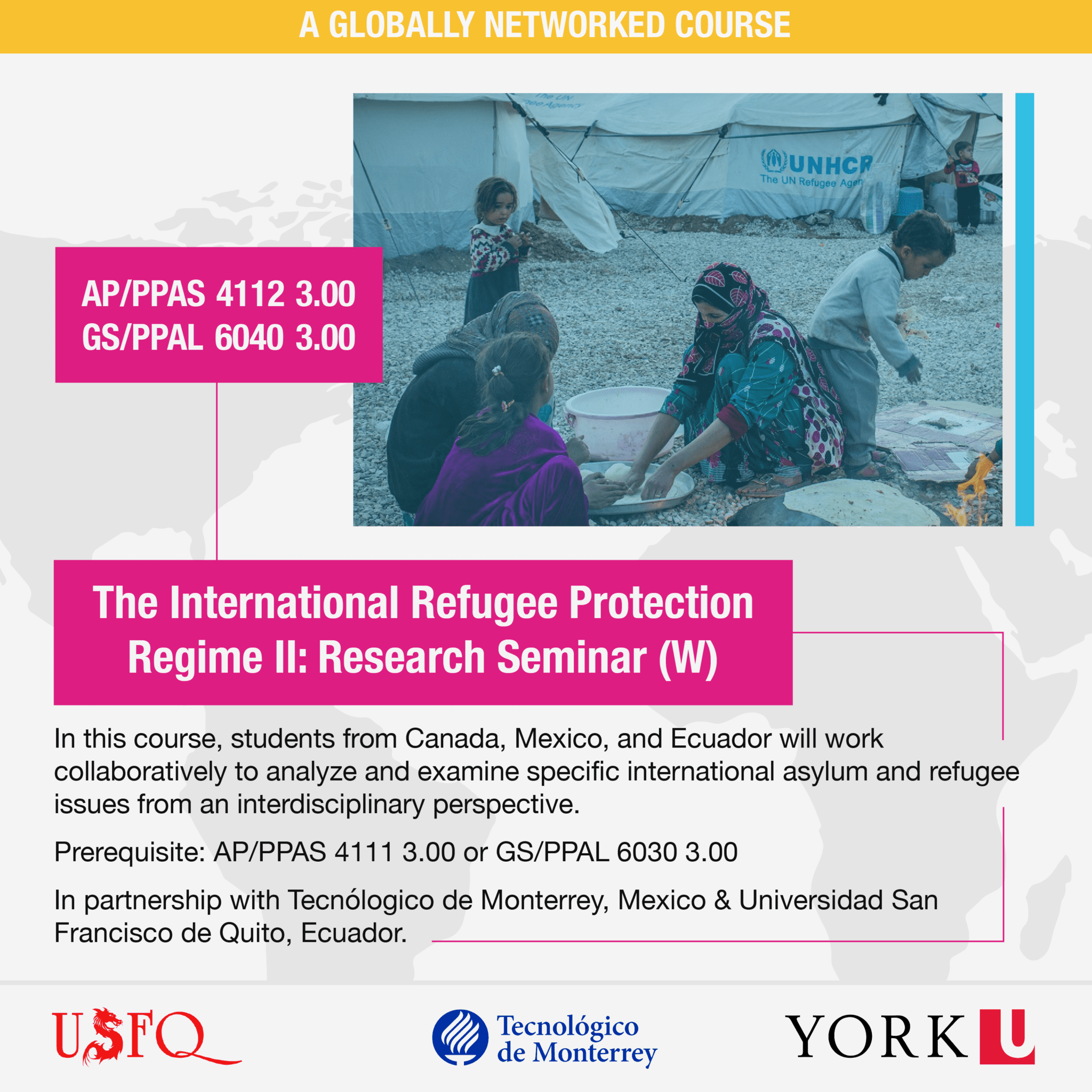
AP/PPAS 4112 & GS/PPAL 6040 3.0 (Winter 2021)
Course Director: James C. Simeon
In partnership with Tecnologico de Monterrey, Mexico and the Universidad San Francisco de Quito, Ecuador.
Course Description: Analyzes and examines specific international asylum and refugee issues from an interdisciplinary perspective. Students will conduct independent research on international asylum and refugee issues and will have an Experiential Education opportunity with an organization working with refugees. Prerequisite: AP/PPAS 4111 3.00.
GNL-Components: The refugee and migration issues and concerns vary dramatically across and within these three countries. For instance, the Canadian refugee status determination (RSD) system is different from either the Mexican or the Ecuadorian systems. Students will be able to compare and contrast how the RSD systems are structured and function in these three countries and how refugee law and practice works on a transnational basis. And, in the process, be able to analyze and evaluate the respective RSD systems with respect to how fairly, effectively, and efficiently they handle refugees' applications for refugee protection.
Global Health Policy: Power and Politics

IHST 2200 (Fall/Winter 2020-21)
Course Director: Mathieu Poirier
In partnership with Fulda University of Applied Sciences, Germany and Babeș-Bolyai University in Romania.
Course Description: Analyzes the process through which global health policy is developed. As national and global initiatives can intertwine, the course begins by exploring and categorizing the manner in which nation governments are structured, and the factors that influence the process of policy decision-making at the national and global levels. Explores case studies that demonstrate global health policy development. Prerequisite: HH/IHST 1010 3.00
GNL Components: Each of the three course directors (one at York and two at Fulda) will create asynchronous guest lectures accessible to co-learners in both universities focusing on a global health policy topic that draws on their expertise and research area. Group discussion activities will be assigned for every co-learning week to foster intercultural dialogue identifying different assumptions, values, and strategies underlying Canadian and German approaches to global health policy. Finally, an international collaborative group project will allow students from both universities to work together to produce an tangible product focused on a specific aspect of global health policy response to COVID-19, drawing on both their lived experiences in Germany and Canada and the shared lecture content.
yFile: York University's News | Published April 7, 2021 Global Health students meet and collaborate with European peers through GNL
Oral Histories in Amazonia
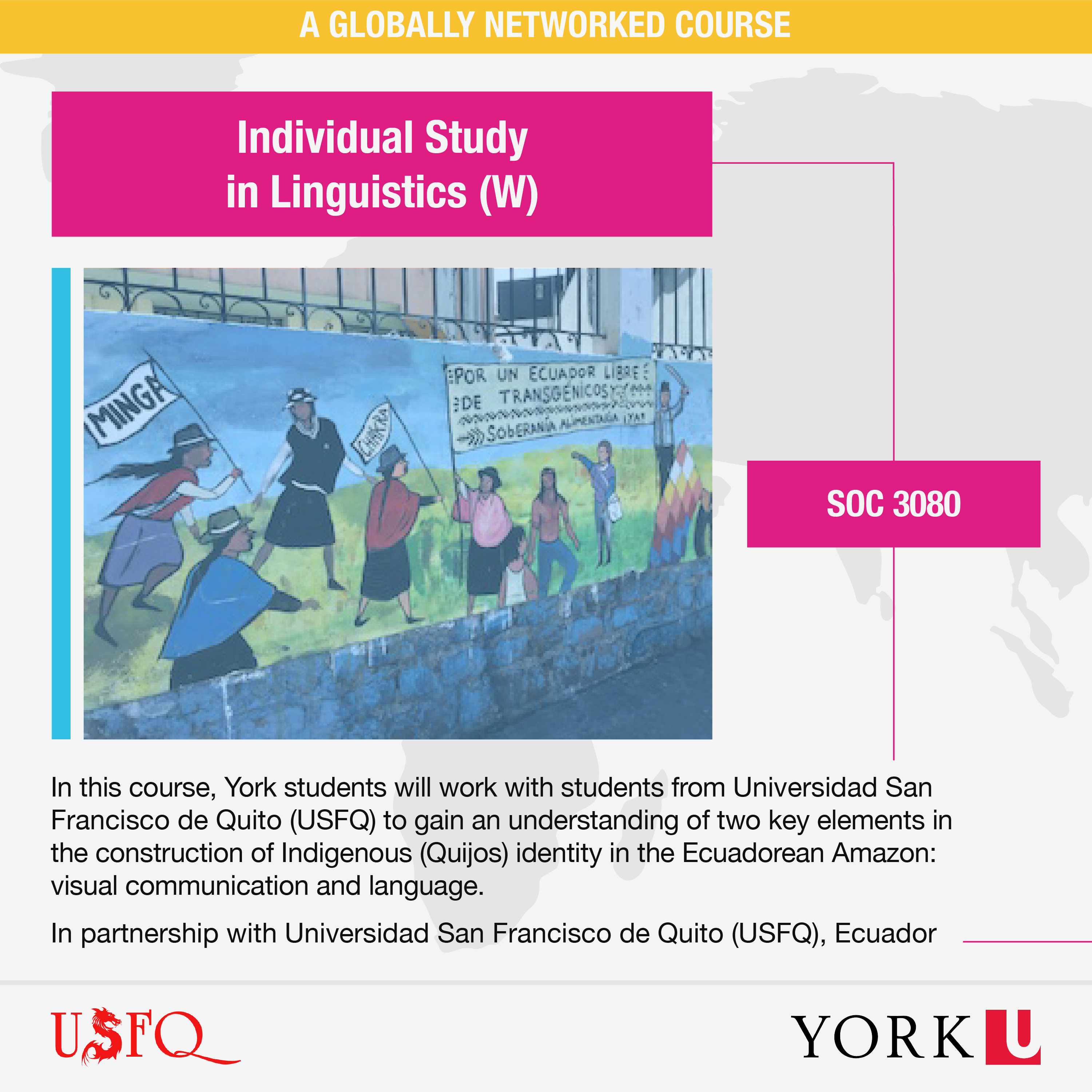
Course Director: Ian Martin
In partnership with Universidad San Francisco de Quito, Ecuador.
Course Description: In this course, students will gain an understanding of two key elements in the construction of Indigenous (Quijos) identity in the Ecuadorean Amazon: visual communication and language. They will also gain linguistic fieldwork experience and develop their digital storytelling skills (scripting/shooting/editing) to gain an appreciation of the role of video/film communication in the construction of Quijos identity.
GNL Components: Students will spend one week preparing online with participation from Ecuadorean partner university faculty. They will then travel to Ecuador to complete the field work: one week preparation with members of the Quijos nation and preparing scripts for video; one week in the field, on Quijos territory filming; one week back in Quito editing and finalizing the project. Glendon students will document their participation by video and text.
Sample Lecture: Challenges and Strategies in Quijos Linguistic and Cultural Revitalization in the Ecuadorian Amazon
by Etsa Sharupi Tapuy et Cheryl Martens
Delivered as part of the Centre for Research on Language and Culture Contact (CRLCC)'s Brown Bag Lunch Talks on Jan 13, 2021
Communication, Health, and Environment

NATS/SOSC 1605 6.0 (Fall/Winter 2020-21)
Course Director: Charles-Antoine Rouyer
In partnership with Universidad San Francisco de Quito (USFQ), Ecuador and Université Catholique de Lille, France.
Course Description: This course connects the three areas of communication, health and environment by exploring the interrelationships between human health and the health of natural and socio-economic environments. It also addresses the influence of mass communication in relation to public policy pertaining to human and ecosystem health. Throughout the course, the sustainability concept is used as a guiding principle.
GNL Components
Fall Term: Students will participate in Hemispheric Student Dialogues on SDGs hosted by the Hemispheric University Consortium and USFQ to explore the connection between natural sciences and social sciences when dealing with the Sustainable Development Goals.
Student Outputs: Showcase of Student Deliverables on SDG 3: Good Health and Well-Being
Winter Term: Canadian students will then work with French students during the early Winter 2021 term, to illustrate visually some of the key concepts studied. The deliverable will be a visual production, which could be part of a one day "Sustainability Festival” in Lille in late March.
International Indigenous Peer-to-Peer Virtual Exchange Program

Winter 2021
Course Director: Dr. Carolyn Podruchny
Program Description
The program provides opportunities for dialogue and collaboration between Indigenous students at York University and their Indigenous student peers located in Australia, Costa Rica, Ecuador, Mexico, and the Philippines. The goal is to facilitate connections among Indigenous students around the world and share knowledge and experiences.
GNL Components: Faculty leads are hosting 8 facilitated virtual workshops on Zoom on a variety of themes surrounding Global Indigeneity, including knowledge, spirituality, political movements, communication, land, food, and identity. Participating students will also be producing a culminating project to reflect their learnings to be displayed at a Public Forum in December.
To learn more, visit the Program Website.


